Welcome
to Dr. Elzeiny Islamic Studies Class
1. This is a
site for translation of the Holy Quran using easy English.
2. This is a site for Meaning of Quran in
Pictures.
3. Books about the Names
of Allah [Book 1] [Book 2] [Brief Meanings]
Choose for yourself. Where would you like to
live?






Table of Contents
Lesson [2]:
The Knowledge of Allah.
Lesson [3]:
The Name of Allah Al-Wakeel (The One we depend on) Part 1
Lesson [4]:
The Name of Allah Al-Wakeel (The One we depend on) Part II
Lesson [5]:
Sweet and Sour Mercy
Lesson [6]:
Pillars of Faith - Believe in Allah - Part I.
Lesson [7]:
Pillars of Faith - Believe in Allah - Part II.
Lesson [8]:
Pillars of Faith - Believe in Angels.
Lesson [9]:
Pillars of Faith - Believe in the Books, the Prophets the Day of Judgment and
the Qadar
Lesson [9B]: Pillars
of Islam – Salah, Zakah, Fasting and Haj.
Lesson [11]: Reply to "Muslims are
terrorists and Islam is the religion of terror"
Lesson [12]: Reply to Islam
Spread by the Sword
Lesson [13]: Reply
to Sharia (Islamic Law) is too Harsh
Lesson [14]: Reply to “Sharia
(Islamic Law) is too old”
Lesson [15] Reply to Hijab
Issues.
Lesson [17]:
Scientific Miracles of the Holy Quran.
Lesson [20]:
Reply to: “Islam Allows Men to have four wives - Women can’t be leaders”.
Lesson [21]:
Reply to “Islam Allows Slavery”
Lesson [22]:
Reply to: Islam is not an American Religion and Mohamed is not an American Name
Lesson [25]: Hadeeth of
Intentions Part II.
Lesson [23]:
Sunah and Bida’a (Inovations) - Legal and Illegal Changes.
Lesson [24]:
The Hadeeth Collections: Hadeeth of
Intentions Part I:
Lesson [26]:
Doing Business with Allah
Lesson [27] Lessons from
COVID-19 Crisis – By Sheikh Dr. Yasir Qadhi.
Lesson [28] The American
Dream – By Sheikh Dr. Yasir Qadhi.
Lesson [31]:
Modern Challenges – Speech to the Muslim Youth by Dr. Yasir Qadhi.
Lesson [32]:
7 Wisdoms of pain and suffering – Shaikh Dr. Yasir Qadhi
Lesson [33]: –
The Day of Judgment [1] (Lecture No. 1). By Shaikh Dr. Yasir Qadhi
Lesson [1]: Our Enemies.

Click here to listen to the class.
Homework:
Part I: If you have not done this already,
send me an email to hw@zeiny.net telling me
about yourself. What you want me to know about you. It is very confidential. I
will not share it with anyone. If you are using your parent’s email, you may
print it out and give to me in person. Please include a picture of yourself in
the email. You can take a selfie picture of yourself and email it to me.
Part II: Listen
to the audio recording of the class, read the notes below and answer the
following questions thoroughly. Short answers are not accepted. You must send
me the homework via email hw@zeiny.net
1. Why did Allah create?
2.
Why didn’t he create just angels
and trees that will cause no corruption?
3.
Who are our four enemies (evil
motives). Give examples.
4.
Why did Allah create the Shytan
and his other enemies?
5.
If there is no meanness, would
kindness exist? Explain why?
6.
Can we have a free will if we
don’t have evil motives? Give an example of a creation of Allah that has no
evil motives at all. Are they being tested?
7.
What are the tests of
submission? Explain and give examples.
8.
Temptations are evil motives.
Give five examples of evil temptations.
9.
After the Shytan starts the
temptations, would he be able to make it grow? Explain.
10. If
no one can avoid the startup of temptations in his/her heart, how can we fight
temptations then?
11. Mention
the story of the man who was transformed to a monster due to temptations.
12. What
are the good motives? Give couple of illustrative examples of each.
13. Why
does Allah allow evil, pain and suffering?
14. Why
did people worship middle Gods? Explain how worshiping middle Gods would cause
you to be taking disadvantage of.
15. When
Allah said to the bad guys to pay charity, what did they say? How can you
respond?
16. If
you make a mistake, is there a way out of it? What is the story of the person
who killed 100 people?
17. What
are the mistakes that can’t be forgiven with repentance?
18. What
are the mistakes that can’t be forgiven without repentance?
19. If
you made a mistake and Allah forgave you and you made the mistake again, would
he forgive you? When would Allah stop forgiving you?
20. If
you made a mistake and Allah forgave you and you made the mistake again, would
Allah cancel his previous forgiveness?
21. When
bad people are asked to give charity to the poor and needy, they reply and say
that we are not going to feed them. Allah is the one that should feed them not
us. How would you reply to this
argument?
Notes:






Lesson [2]: The Knowledge of Allah.


Click here to listen to the class.
Homework:
Listen to the audio recording of the class, read
the notes below and answer the following questions thoroughly. Short answers
are not accepted. You must send me the homework via email hw@zeiny.net
Allah
knows everything that happen and would happen in the future. Allah guides whom
so ever he wills and misguides whom so ever he wills. Allah seals the ears of
the bad guys so that they can’t hear the truth. Allah blinds their eyes so that
they can’t see the truth. Allah locked their hearts from understanding the
truth. Allah already wrote everything that will happen in a book.
1. If this is the case, then how come we have freedom of choice.
2. He already wrote our deeds. We have no choice. How come he is
punishing the wrong doers.
3. Allah doesn’t want to guide me. It is not my fault. How do
you reply to that ridiculous argument?
4. How can I know your answer ahead of time without forcing you to
follow my answer?
5. What is the opposite of the statement "Allah guides whom so
ever he wants and misguides whomsoever he wants". Prove that the opposite
doesn't make any sense.
6. The names of Allah (الأول) means the first without start and the twin name of this name
is (الآخر) which means the last without end. Explain this in terms of
time. Use the example of the story board.
7. Explain how Allah controls the time and he does not change or age
with time.
8. On the other hand, he made the time able to age everything else.
Elaborate on the previous statement and use that to explain how Allah contains
time and everything else is contained in time.
9. Mention the story of Omer RA with the guy who was arguing that he
stole because it is the decree of Allah and it is not his fault. What was the
reply of Omer RA?
10. Is our will superior to Allah's will? The following Ayat in Surat
Al-Takweer [29:28-29] have the answer.
Explain them.
11. The knowledge of Allah is surrounding knowledge. What does that
mean?
Notes:







Lesson [3]: The Name of Allah Al-Wakeel (The One we depend on) Part 1


Click here to listen to the class.
Homework:
Listen to the audio recording of the class, read
the notes below and answer the following questions thoroughly. Short answers
are not accepted. You must send me the homework via email hw@zeiny.net
1. What is the meaning of the name Al-Wakeel
2.
Since
we cannot expect Allah to vacuum your carpet and wash your dishes, then how do
you depend on Allah in both of these tasks?
3.
How
do you reply to the one who says "If I do my part, then there is nothing
left for Allah to do".
4.
Explain
the word "Tawfeeq توفيق". Who does control Tawfeeq?
5.
Explain
the probability of failure?
6.
Mention
the story of tying the camel and how did Prophet Mohamed comment on this?
7.
How
do you reply to the ones who say "I tied the camel, what is left for Allah
to do"?
8.
How do I
depend on Allah to heal my sicknesses?
9.
What
did Omar Ibn Al-khatab say regarding the people who stayed in the Masjid
claiming that they depend on Allah to bring them sustenance? Explain?
10. The engineer who built Titanic said "Even God cannot sink
it". What happened and how did Allah make him fail.
11. Depending on Allah is the job of the heart. Doing your part is the
job of the brain and muscles. Explain this sentence with examples.
12. Explain
in details the plan of immigration of the Prophet SAW from Macca to Medina.
Notes:





Lesson [4]: The Name of Allah Al-Wakeel (The One we depend on) Part II


Click here to listen to the class.
Homework:
Listen to the audio recording of the class, read
the notes below and answer the following questions thoroughly. Short answers
are not accepted. You must send me the homework via email hw@zeiny.net
1. What
is the law of be and it will be? Did Allah create and has been ruling the
universe using this law? Explain in details.
2. If
Allah will excuse anyone from using the laws of nature, who would be exempted.
3. If
you study, you pass. Muslim did not study and non-Muslim studied
4. Who was the woman of the two belts? Why did she get this name?
What was her relationship to the Prophet and Abo Bakr? What was her role during
the Prophet migration to Madina?
5. Who was the companion of the Prophet during his immigration?
6. Who was the person who was spying on the Arab Lords? How? What was
his relationship to Abo Baker Al-Sidiq?
7. Who was the guy that was trying to capture the Prophet SAW for a
prize? What was his name? And what was the prize? The Prophet promised his
something. What was it? Why did the Prophet promise him? When did this promise
become true, i.e. after what battle?
8. What is the meaning of the word desperate? How is it related to
this subject, which is how to depend on Allah?
9. When does Allah help you with unseen soldiers? How do you qualify
for them?
10. How many times the Prophet SAW plan of Higra failed and what were
the unseen soldier that Allah helped him with? Explain in details.
11. Why did Allah make the Prophet follow the laws of nature in his
immigration to Madian but in the night journey he gave him the miraculous
animal called Al-Borak? Why? What is the difference between both the night
journey and the Higra?
12. Allah sent fruit basket from Jannah to Mariam when she was in her
room worshiping Allah. After giving birth to Prophet Isa, why did Allah ask her
to shake the palm tree to get dates to eat and did not provide her with a fruit
basket from Jannah?
13. What happened to the 40 guys that were surrounding the house of
the Prophet SAW? What did the Prophet do to them before he leaves? Why?
14. What is the name of the cave where is the Prophet was hiding in?
Why did he hide and did not go straight to Makah?
15. Why did the Prophet saw hire a guide man? When did he meet with
this man?
16. Failure to plan is a plan to fail. Explain this statement and how
is it related to the subject of how to depend on Allah?
Notes:



Lesson [5]: Sweet and Sour Mercy



Click here to listen to the
class.
Homework:
Listen to the
audio recording of the class, read the notes below and answer the following
questions thoroughly. Short answers are not accepted. You must send me the
homework via email hw@zeiny.net
1. Mention the story of Prophet Mosa and the Righteous slave of Allah. Hint use Quran 18:60-82
2.
What are the two
types of knowledge? Explain.
3.
What are the two
types of mercy?
4.
In the first event,
which was damaging the boat, who was the one who made the decision? Which type
is this mercy?
5.
In the second event,
which was killing the boy, who was the one who made the decision? Which type is
this mercy?
6.
In the third event,
which was fixing the wall of a ruined house, who was the one who made the
decision? Which type is this mercy?
7.
Explain how is that
you may pray for something, which is bad for you, or hate something, which is
good for you. Give few examples.
8.
Mention few lessons
that you learned from the story.
9.
When something bad
happens to you, are you allowed to feel sad and cry? You should change your
sadness to what?
10. When something good happens to you, are you allowed
to feel joy and happiness? You should change your Happiness to what?
11. When you are worried, you should change your worry to what?
Notes:



Lesson [6]: Pillars of Faith - Believe in Allah - Part I.


Click here to listen to the class.
Homework:
Listen to the
audio recording of the class, read the notes below and answer the following
questions thoroughly. Short answers are not accepted. You must send me the
homework via email hw@zeiny.net
1. About the example of the people who live in 2D, can we see them? Can they see all of us? What would they see if you place your finger in their 2D plane? Use the metaphor of the people who live in 2D to show that we are being seen and accessed from higher dimensions.

2. Do we see everything in existence? Mention few examples of things
that exit but we don’t see them.
3. Mention the Hadith where Angle Gabriel came to the Prophet and
mentioned to him the pillars of Islam, Pillars of Faith and Ihsan. Write only
the part that mentions the pillars of faith.
4. What did Allah give us so that we can see him by our brains? What
do we have to understand the nature of Allah? Explain.
5.
How many names Allah has given
us? How many names Allah has overall? Write the Hadeeth that proves your statement?
6. What are the two worlds that we have? To which one Allah, his
angels and life after? What world that we live in now? To which world
belong the things that we can feel using any of the five senses?
7. From an Islamic perspective, what is the difference between to
know and to believe? Use the example of the furnace.
8. When the angels ask you the three questions right after death, how
come you can't lie and give the correct answers?
9. Is lying more difficult or saying the truth?
10. Lying takes a lot of brain work and good memory. Mention the
joke of the teacher who quizzed the four students about the flat tire.
11. Compare the punishment in the grave with nightmares.
12. Compare the joy in the grave with sweet dreams.
13. If you want to torture someone in this life, which part (Body or
Soul) you can apply the torture non? How about in the grave? How about in Hell
fire?
Notes:





Notes from
Previous Years:

Lesson [7]: Pillars of Faith - Believe in Allah - Part II.


Click here to listen to the class.
Homework:
Listen to the
audio recording of the class, read the notes below and answer the following
questions thoroughly. Short answers are not accepted. You must send me the
homework via email hw@zeiny.net
1.
How much of the
earth population deny the exitance of Allah?
2.
Brief describe
trinity and how does it relate to the Islamic realization of Allah?
3.
What
is monotheism in Quantity and Quality? Explain.
4. Allah is One and is a Unit. Explain/
5. How does Surat Al-Ikhlas present the image of Allah? In other
words, how is Allah described himself in the Surat Al-Ikhlas?
6. Does the Arabic bible use the name Allah to describe God? What is
the significance of this?
7. What is the meaning of that if there is someone up there, let him
touch my back?
8. Why do atheist people go to the extreme of denying the presence of
God?
9. The example of the ship that leaves India and reach New York. How
does this example affirm the presence of God?
10. What is the meaning of the statement “God did not create man. Man
created God”?
11. Explain how is the Christian religion was used as a slave mind
management system? What was the response of the smart slaves?
12. Why does Allah allow evil to happen?
13. Tell the joke about selling parts of the paradise by the church in
the old days.
14. Explain the Islamic views of the theory of evolution. Does Islam
reject the entire theory?
15. Why the racist people draw monkeys to describe black people? How
does this relate to the theory of evolution?
16. Explain how theory of evolution (Darwin’s theory) would justify
the killing of humans.
17. What is the Arian race? Who promoted its superiority over all
other races? Explain the disaster that resulted from that.
18. In the incident of the woman who forgot her children in the garage
where the door is closed and the engine is running, what is the first lesson
she was taught in the grief management classes? How is this lesson related to
the existence of Allah?
19. When we see beautiful painting of nature, how does this make us
feel about the artist and Allah?
20. If every company has a president and every country has a chief,
how is this fact related to the presence of Allah?
21. What is the name of the people who just ignore the presence of
Allah? Briefly describe the religion of Buddhism.
22. Explain logically why does the fact that has faith would do more
charity than the society that doesn’t have faith.
Lesson [8]: Pillars of Faith - Believe in Angels.

Click here to listen to the class.
Homework:
Listen
to the audio recording of the class and answer the following questions
thoroughly. Short answers are not accepted. You must email me the homework via
email hw@zeiny.net
1. Why is it not appropriate to Allah to do all
tasks by himself? Give examples of tasks that it is not appropriate for Him to
do.
2. What is the Royal way of getting something
done?
3. Body of energy made of what? Can they take
the form of humans? Did Gibril came to the Prophet in a form of a man? What was
the man look like?
4. In the Hadith of Pillars of faith, the Hadith
that we are studying now, who was talking to the Prophet?
5. Angels don’t ever disobey Allah? Why?
6. Do angels go to hell or heaven?
7. Because of the coupling between our bodies
and souls, the body is limiting the soul. Explain that statement in details.
8. What happen when we die, are we going to be
limited to the five senses? Are we going to be able to see the world of unseen?
Explain in details.
9. Give an example of how Jinn and angels can go
through walls.
10. Complete: In order for Jinn to be seen by us,
they have to ............, and they will be controlled by our laws of
....................
11. What is the interface between the body and
the soul? How can the soul control the body? How can you split them apart so
that you don't feel the pain during surgery?
12. Mention the names and the role of 11 angels.
of different angels doing different tasks.
13. The wandering angels. Don’t enter a house
that has a dog or picture. Don’t attend a lecture or a talk where a woman is
not wearing proper hijab.
14. What is the job of the Guardian Angels? Do
they do their job with both good and bad guys or only good guys?
15. Describe the Shytan’s access to us? Can he
have physical access to us?
16. Regarding he angels on the right and left,
who is in charge of the other? Why?
Notes:


Lesson [9]: Pillars of Faith - Believe in the Books, the Prophets the Day
of Judgment and the Qadar

Click here to listen to
the class.
Homework:
Listen
to the audio recording of the class and answer the following questions
thoroughly. Short answers are not accepted. You must email me the homework
Faith in Books and Prophets:
1.
What
is the difference between a Prophet and Messenger? Explain how that the
messenger is sent to non-believers but the Prophet is sent to believers.
Explain in details.
2.
Since
no more Prophets will be sent, Allah substituted the Prophet with what? Explain
how and why?
3.
Did
each Prophet teach the same faith about Allah? Why? Explain.
4.
Each
Messenger came with different Sharia laws. Give three examples of differences
between the Sharia laws of the Messengers.
5.
Explain
why the three heavenly religions teach that the only acceptable religion and
way of life is their version of religion. What would happen if they don’t teach
that?
6.
Who
are the people of the book? Explain do we consider them the best Non-Muslims.
7.
Because
Prophets are teachers, what do they need to teach from?
8.
What
are the benefits of having books (scriptures) while the Prophets are alive?
What is the use of these books after the Prophets die?
9.
All
books now have been changed due to translations and manipulations except the
Quran. Why did Allah declare that he will be guard the Quran from being lost,
manipulate it or changed until the Day of Judgment?
10. Explain the telephone game and how
it affected the authenticity of previous scriptures?
Belief in the Day
of Judgment:
1.
If
there is no day of judgment, then good guys and bad guys end up equal. Explain
how they are the same. Is it fair?
2.
If
there is no day of judgment, then it will make no sense for us to fight our
temptations and lower desires. Explain why.
3.
What
would you say about a judge who makes good guys equal to bad guys? How this is
related to belief in the Day of Judgment?
4.
What
are the three spiritual motivations that will motivate someone wake up very
early in the morning and go to Fajr?
5.
How
many rounds we have? The true winner is the one who wins which one of them?
Explain.
6.
Prove
logically that the society that has faith gives more charity than the society
that doesn’t have faith.
Belief in the Qadar:
1. Who
has been writing our books when we were children? What happens as you grow
older?
2. Allah
knows about what we will be written in our books. How do you reconcile this
with the fact that we are writing our own books and that we have the freedom to
write them?
3. What
are the decisions that have been made by Allah and we have no choice over? Can
we question Allah, reject or change any of these decisions?
4. What
is the story of the parents who accidently left their children to die in the
garage due to carbon dioxide coming out of their running car? What did they do
after the accident to be able to handle with the harsh reality?
5. In
the grief management classes, what is the first thing they teach? How is that
related to the sixth pillar of faith in Islam?
6. Why
bad things may happen to good people? Isn’t it cruel to make good people
suffer? Relate to the story of Musa (AS) and the righteous slave, ruining the
boat and killing the boy.
7. The
righteous slave represents the Qadar of Allah. Explain.
8. What
is the wisdom behind Muslims getting defeated in the second round of the battle
of Uhud? What would happen if the defeat didn’t take place?
9. Some
people are born with all the fame and wealth they need, while others are
deprived? Are we born to equal rights? Are we born to equal opportunities? Who controls the distribution of wealth?
10. If
our share of wealth, health and whatnot, were pre- assigned. Then what is our
role in obtaining them? Explain and mention the story of the camel of Ali Ibn
Abi Talib (RAA).
Lesson [9A]: Pillars of Islam – After Faith, there is No Deity Except
Allah and Mohamed is His Messenger Must be Established First Before any Thing else.

Click here to listen
to the class.
Homework:
Listen
to the audio recording of the class and answer the following questions
thoroughly. Short answers are not accepted. You must email me the homework.
1.
What is the difference between the 6 pillars of faith and the 5
pillars of worship? Which one must come first?
2.
Prophet Mohamed was the most loved and respected by his people. He
was Al-Amin (the most trust worth) and then he became the most despised and the
most liar who lies about God himself. Why? What happened?
3.
Why did the Arab lords reject La Ilah Ila Allah and Mohamed is
Rasol Allah?
4.
How many years the Prophet SAW lived? How many years was he a
Prophet? How many years in Makkah? How many years in Al-Madina? What was the
purpose of the Makkah era and what was the purpose of Al-Madina period?
5.
What is the difference between the Ayat of the Quran that was
revealed in Makkah and the ones that was revealed in Al-Madina?
6.
Using the metaphor of building a foundation, which one comes first
removal of the dirt or establishment of foundation? How is this related to the
topic?
7.
Did La Ila Allah come first or the moral values, or the rules of
Halal and Haram? What did Aisha RA said about obeying the rules of dos and
don'ts? Were these rules come first or last? Why?
8.
How many easier ways the Prophet SAW could have used to establish
Islam? Summarize all of them. Explain how the intended objective
of each way was achieved after the establishment of {La Ilaha Ila Allah.
Mohamed Rasool Allah}.
Notes:
Click here
for the written notes.




Lesson [9B]: Pillars of Islam – Salah, Zakah, Fasting and Haj.





Click here to listen to the
class
1. What
are the tests of Islam (tests of submission)? Why are we being given these
tests? Explain how Ramadan is a test to us.
2. Using
the example of a father who sent his son to study in a faraway college, explain
the following:
a. Concept
of Salah? What is the phone number you need to call on Allah?
b. Concept
of laws of nature? Who to thank for the check? How is that relevant to the law
of nature?
c. Evolution?
hint I have no father or mother.
3. Describe
the remembrance of Allah curve with time to show the relationship between
prayers and the remembrance of Allah.
4. Focusing
in the prayer as a problem. In what case it would be forgiven and in what case
it will not?
5. What
is the name of the Shytan who’s job is to make people unable to focus during
the prayer?
6. Mention
he joke about the guy who insisted that the Imam prayed Duhur two Raka instead
four Raka?
7. What
do we mean by the spiritual muscles? How is this related to Ramadan?
8. Why
Ramadan is a training camp? Mention four of the most important benefits of
fasting Ramadan (the ones mentioned in class).
9. What
is the Hadith Qudsy and how is it different than regular Hadith or Quran?
10. (Optional)
In the Hadith Qudsy, Allah said that all the worship of the children of Adam to
him except fasting it is to me and I am the one who would reward for it.
Explain the meaning of this Hadith.
11. If
people convert their cash money into other forms (like diamond for example) for
the purpose of evading Zakah. Would they be exempted from this Zahah or what?
12. Mention
the rules of Zahat of cash, gold and other valuable things.
13. Mention
the rule of Zakah for farming for both cases of irrigation (by rain or by
effort).
14. Mention
the rules of the Zahah for oil and other mines.
15. Regarding
paying Zakah on jewelry, boats, cars and homes. In what situation do we have to
pay Zakah on them and in what situation we don’t have to pay Zakah on them.
16. If
you loan someone money, do you have to pay Zakah on the loan?
17. What
are the lifelong loans, such as mortgage, is it allowed to deduct the loan
amount from the Zakatable money?
18. In
Surat
Yasin 36:47, Allah mentioned that bad people argue that they shouldn’t feed
the poor and needy because if Allah wants them to be fed, then he should feed
them himself. How do you reply to this argument?
19. Does
Allah provide the share of wealth of the poor people directly to them? Explain.
20. Fill
the blanks. People travel and go to crowded places for
......................................... Muslims travel to Haj for
.........................
21. How
come that Allah would let the Masjids, his houses on earth, burn and would let
the people doing Haj to his house die?
22. Explain
the following diagram
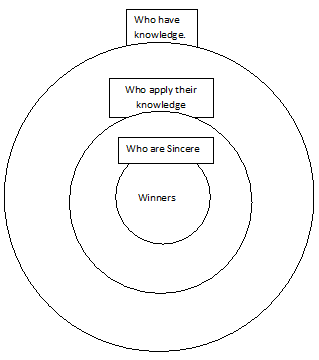
Notes:
Lesson [10]: Reply to "Quran Says: Kill them where ever you find them". Does the Quran Really Sanction Violence Against 'Unbelievers'?
Defending
Islam against Stereotypes.
".

Click here to
listen to the class.
(Optional) See Dr. Yasir
Qadhi lecture about modern Jihadist.
(Optional) See Dr. Yasir
Qadhi lecture about the Reality of ISIS: Modern Muslim Fundamentalism.
(Optional) See Dr. Yasir
Qadhi lecture about Muslims Condemn Terrorism.
(Optional) See Dr. Yasir
Qadhi lecture about American Foreign Policy and the Rise of ISIS.
(Optional) See Reply of the Muslim Scholars to the arguments
raised by ISIS:
Letter in Arabic, Letter
in English and Letter in Other Languages.
1. Regarding the
expressions “infidels” and “holy war”. Do they exist in Islam? What were the
unbelievers called in .
See
Surat Al-Kafiron [109].
2. See
Surat Al-Kafiron [109] gives a message of tolerance. How? Explain?
3. Write Ayat Quran (2:190 to 192) that include the
statement "Kill them where ever you find them". Explain the Ayat and
then explain the deception of those who quoted this part of Ayah to stereotype
Islam.
4. What were the
instructions given by the Prophet saw to the armies before they left to battle?
5. Quran (5:5) Proves that Islam is very
tolerant with other religions. Explain in details.
6. If Muslim men can marry
non-Muslim women, then why Muslim women can't marry non-Muslim men?
7. Explain the rule in (Quran 60:8-9). Show the tolerance in these
Ayat.
8. Why 911 is considered to
be an evil act in Islam? Explain how the name of Islam was hijacked in 911?
9. Do radicals kill
non-Muslims only? Explain. Why do they kill Muslims?
10. Vigilantism is
prohibited in Islam. Explain why and relate to 911.
11. We and the people of the
book worship the
same God Quran [29:46]. How do we reach to God and how do Christians
reach to God?
12. How do we Muslim view
trinity?
13. Do Muslims honor Jesus?
How is Jesus viewed in religions other than Islam and Christianity?
14. Bin Laden said, it is
either with us or you are a hypocrite. George W. Bush said, you are either with
us or with the terrorists. Do you agree with these statements? What is your
position from these statements?
Notes:
Lesson [11]: Reply to "Muslims are
terrorists and Islam is the religion of terror"
Defending Islam against Stereotypes.


Click
here to listen to the class.
(Optional) See Dr. Yasir
Qadhi lecture about modern Jihadist.
(Optional) See Dr. Yasir Qadhi
lecture about the Reality of ISIS: Modern Muslim Fundamentalism.
(Optional) See Dr. Yasir
Qadhi lecture about Muslims Condemn Terrorism.
(Optional) See Dr. Yasir
Qadhi lecture about American Foreign Policy and the Rise of ISIS.
(Optional) See Reply of the Muslim Scholars to the arguments
raised by ISIS:
Letter in Arabic, Letter
in English and Letter in Other Languages.
Homework:
The
example of Hitler

1.
How do you reply
to the ones who say Bin Laden shares the same religion as yours?
2.
What religion was
Hitler? How many people did he killed?
3.
Is it right to
blame Hitler’s acts on his religion?
4.
Do we need to
tell the Cristian people that Hitler doesn’t represent Christianity or they
already know that?
5.
Do we need to
tell the Cristian people that Bin Laden doesn’t represent Islam or they already
know that?
The example of Anti-Abortion Terror

1.
What is the
Christian Army of God?
2.
What was its
motives?
3.
How many kinds and counts of violence it did?
4.
Was the Christian
Army of God motivated by Christianity?
5.
Is it okay to
blame Christianity for it? Why or why not?
The example
of IRA

1.
What is the IRA?
What was its religion?
2.
What did it do to
be considered an Army of terror?
3.
What was its
motives?
4.
How many kinds and
counts of violence it did?
5.
Was the Christian
Army of God motivated by Christianity?
6.
Is it okay to
blame Christianity for it? Why or why not?
The example of Timothy McVeigh

1. Who is Timothy McVeigh? What religion he was?
2. What did McVeigh do? How many were his victims?
3. What was the motive behind McVeigh acts?
4. Can we say that McVeigh acts represent America? Why or Why not?
5. What was the end of McVeigh?
The example of Ku Klux Klan (KKK)
Use information from this
link to answer the questions below

1.
What is the KKK?
What was its religion?
2.
What was its
motives?
3.
How many kinds
and counts of violence it did?
4.
Was the KKK
motivated by Christianity?
5.
Is it okay to
blame Christianity for it? Why or why not?
Other Arguments:
1. What is the point of mentioning these examples?
2. All American citizens were hurt once, but we American Muslims were
hurt twice. Why? Explain.
3. When a Muslim commits a crime, the media says a Muslim committed a
crime. But when a Christian commit a crime, the media mention the name of the
criminal only and no mention of his religion. Why and what have been the
motives of the media for doing this?
4. Mention the joke about the Muslim who saved a little girl from
being killed by a dog.
5. Was the intent of 911 just to damage the building and kill people?
What is the other reason, which related to unity? Did the terrorist achieve
these objectives?
6. Who was Saddam Husain? Was it appropriate for the media to go to
the Masjid inquire about Sadam Husain and Bin Laden? What is the right place to
inquire about them? Why?
7. Use math to prove that the Al-Qaeda is an extreme radical
exception? Would the exception prove the rule to be true or false? Can you have
an exception if you don’t have a rule?
6. Do people who take Islam seriously be considered radicals? Why?
7. Watch this video about
interview of the news to me and my family right after 911 and mention my
arguments and concerns, and if you agree or disagree.
8. Visit this
site and write what do you think about what is mentioned. Are all
terrorists are Muslims?
9. (Optional) Who are the ones who carried the largest number of acts
of terrorism in US?
10. (Optional) What was the the deadliest act of terrorism within the
United States prior to the September 11 attacks?
11. (Optional) Summarize the arguments by President Obama regarding
Islam in this video clip.
12. (Optional) In Islam, do we build coalitions based on justice or
religion? Do you prefer to have a bad Muslim friend or a good non-Muslim
friend?
Notes:
Lesson
[12]: Reply to Islam Spread by the Sword
Reply to stereotypes:
1. Islam is a religion that
spread with the sword.
2. Islam is a religion that
doesn’t tolerate other religions.
3.
In a Muslim state, you have to either give up your religion or get
killed.

Click here to listen
to the class
Click here to see a presentation about the subject
Homework:
Listen to the audio recording of the class and answer
the following questions thoroughly. Short answers are not accepted. You must
email me the homework via email hw@zeiny.net
A. What made people say that about Islam?
B. Summarize the following replies to the
Stereotypes that Islam spread by the sword (violence).
1. Muslims made the invaded county better than it
was.
2. When the British occupied Egypt, did they make
Cairo better than London? When the French occupied Algeria, did they make
Algeria better than Paris. When Gorge Bush occupied Iraq, did he make Bagdad
better than Washington or worse than Tijuana?
3. Indonesia.
4. The sword opens a land not a heart.
5. Did the Islamic law accommodate non-Muslim
minorities living in Muslim countries?
6. Non-Muslim worship places are preserved intact.
7. Quran said that "No compulsion in
religion" Quran (2:256).
C. What is the difference between liberation and
occupation.
D. (optional) What is the story of the Coptic
guy and the son of Amro Ibn Al-As عمرو بي العاص.
E. What is the inquisition? What religion was
the one who did the inquisition? where and when did it start? What was the
purpose? How long did it last? Did Muslims do any inquisition?
Notes:
Answers:
1) From the Quran: The following verses from the Quran forbid
imposing the religion on people. See Quran 2:256 [There is no compulsion in
religion], 50:45 [Can’t force them to believe]
and 10:99 [Your Lord could have made all
people on earth believe. Who are you (Mohamed) to compel them against the will
of God].

2) The sword opens a land and doesn’t open a heart.
In other words, the sword was used to expand the empire not to expand the
religion.

3) In Islamic law (Sharia), any declarations,
consent, marriage, divorce, contractual agreement, decision, testimony imposed
by force is invalid.

4) Using force to compel religion produces nothing
but hypocrisy. The person who is under the threat of the sword will not love or
practice Islam nor will teach it to his/her children.

5) Unlike the history of Christianity that has 400
years of inquisition; the history of Islam doesn’t have
any form of inquisition.
6)

7) The person who loves and practice Islam, as well
as teach Islam to his children is not the one under the threat of the sword.

8) The largest population of Muslims in the entire
world is Indonesia. Islam came to it without any military
interaction. It was because Muslim merchants came in the country to do
business.
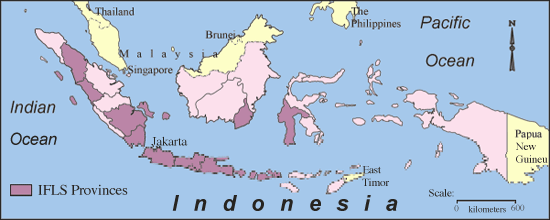
9) The difference between occupation and liberation
is that occupation makes the invaded country worse than it was while libration
makes it better than it was. Muslims made the invaded countries better than it
was, even better than their own home land. An example of this fact is
Spain. Click here to see how Muslims made Spain
better than the homeland they came from, including Mecca and Madina.
10) Muslims protected the worship places of other
religions. See the pictures of 2000 year old churches in Muslim courtiers that
have been protected by Muslims during the Islamic rulings.
Very Old Churches in Egypt still exist and respected to date.

11) Church of Nativity in Bethlehem where Jesus
was born still exist and respected to date in Palestine.
12) Crying Wall for Jews still exist and respected
to date in Palestine.

13) Muslim states had many minorities that have been
living safely for hundreds of years and their places of worship are protected
by the Islamic state.

14) The Islamic Law (Sharia) has a well established law
that protects the rights of people of other faith that live in a Muslim state.
The Christians and the Jews are called the people of the book in the Islamic Law. In
addition, Other non Muslims are called the people of Dhima in the Islamic Law.

15) Islam allows a Muslim man to have a wife who is
Christian or Jewish Quran 5:5. This is the highest level of
tolerance when the most beloved person to your heart and the mother of your
children is from a different religion.


16) Islam allows Muslims to have relationships with
Non Muslims who are not fighting against the religion of Islam Quran 60:8 & 9 [It basically says that God doesn’t
mind if you have non Muslim Friends and loved one but he doesn’t want you to
have relationships with enemies of the Religion]

17) The reason people entered Islam after the Muslims
used the sword to open the land was because they saw the difference between the
old government and the new government. They have seen what Islam brought them
and they liked it.

18) What Happens to the Muslims who Denounce Islam
Publicly.

• Islam has a policy that says that if you don’t
harm the religion, the religion will not harm you.
• At the time of the Prophet, enemies of Islam
used to embrace Islam in the morning and then denounce it in the evening
announcing publicly that Islam is a bad religion. It was a tactic to drive
people away from Islam. The Quran mentions this fact Quran 3:72.
• To stop people from doing this, the Prophet
order that the ones who embrace Islam and then denounce it publicly be given
three days chance to correct themselves publicly or get killed.
• If people denounce Islam privately, nothing
happens to them.
• During the three days all what the person has to
do is to declare publicly that he was wrong and then he/she will let go. It is
an easy way out.
• This rule applies only in Muslim countries.







Lesson [13]: Reply to Sharia (Islamic Law) is too Harsh
Defending Islam against Stereotypes


Click here to listen to the
class
Homework:
Listen to the audio recording of the class and answer the following questions thoroughly. Short answers are not accepted. You must email me the homework via email hw@zeiny.net
1. Is
Sharia intended to protect the public space or the private space?
2. Does
Sharia allows spying on the people in their private places? Mention the story
of Umar and the drunk people.
3. Why
they say that Sharia is harsh. Mention the punishments of the examples given in
class and you can add your own as well.
4. Indeed
Sharia is harsh on criminals. How does this affect the number of future
criminals and victims?
5. Justice
to the favor of criminals (easy punishment) versus justice to the favor of
victims (harsh punishment). Explain how and why Sharia is kind to victims.
6. Explain
the benefit from a crime / cost of punishment ratio, i.e. the worth of a crime.
Explain how Islam keeps this ratio low? Give some numerical examples to explain
the point?
7. Difference
between the rich thieves and the poor thieves in terms of how harsh the
punishment in both cases?
8. When
did Omar R stop cutting the hands of the poor thieves?
9. What
are the five objectives of Sharia? Explain each one with examples. Use this link.
Notes:
Worth
of a crime = (100% - Chances of getting away) × amount of
stolen money

Five objectives of Sharia
1.
Protection of religion.
2.
Protection of human life
3.
Protection of intellect
4.
Protection of progeny
5.
Protection of wealth
Use this link for
explanation.







Lesson
[14]: Reply to “Sharia (Islamic Law) is too old”
Defending Islam against Stereotypes

Click here to listen to the class
Homework:
Listen to the
audio recording of the class and answer the following questions thoroughly.
Short answers are not accepted. You must email me the homework via email hw@zeiny.net
1. Is there any country without laws?
2. If we reject the divine laws, what is the remaining alternative?
3. Who is the only one that can make fair laws and why? What happen when humans make laws?
4. Today's societies are different than the societies 1400 ago. How come Sharia laws still apply now after 1400 years when it was revealed to the Prophet SAW? How come the Sharia still applies to all society at all places?
5. What is the fixed part of Sharia that does not change with time and place and what is the variable part that changes with time and/or place?
6. Do the Ten Commandments still apply till today? Do they change with time and place?
7. Explain the difference between Hallal and Haram versus wise and unwise?
8. Does Sharia allow freedom for Haram or corruption? What freedoms the Sharia provides?
9. If Sharia allows freedom between Hallal alternatives, how do you select which alternative to use?
10. Give an example how the Capitalism laws change with time and place (Lake Tahoe for example). Comment on that. Which value is controlling? Moral values control the economy or the economy is controlling moral values in Capitalism?
11. Capitalism is based on selfishness and greed. Give two examples.
12. Mention
three haram things in doing business?
Notes:


Last Year Notes:



Lesson
[15] Reply to Hijab Issues.
Defending Islam against Stereotypes

Click here to listen to the class
Homework:
Listen to the audio
recording of the class, read the notes and answer the following questions
thoroughly. Short answers are not accepted. You must email me the homework via
email hw@zeiny.net
2. What made people say that Hijab is a
form of oppression?
3. Is Hijab a Fard?
a. Write and explain the three Ayat that that prove that Hijab is mandatory not an option? The Ayat numbers are 24:31, 33:59 and 24:60.
b. Hijab is a Fard is proven by Ahadeeth. One of them is the Hadeeth of Asma. What is the Hadeeth of Asama when the Prophet SAW saw her without Hijab?
c. Hijab is also proven by continuous practice since the days of the Prophet. Explain.
4. The Nature of women = Feminine side (physical appearance) and professional side (talent).
a. Explain.
b. Which side is for business and which side is for husband family life?
c. Can the Feminine part (Physical appearance) be used for business?
5. Women and girls can be spreading unethical temptations by physical appearance. Explain how?
6. The Shytan uses the physical appearance to generate haram lust. Explain.
7. Why does Islam want to hide the physical appearance? Explain.
8. Some commercials use the body of the women to promote product.
a. They appeal to what attributes of women to promote their products and ideas?
b. Aren’t they lust? Explain.
c. Mention the story and the reply of the Muslim women who was told that why would employers hire you instead of men who have fewer excuses? What was her reply?
9. Because of physical appearance, pretty women may be promoted over talented ones. Explain.
10. How do you reply to the one who says that my talent is my look?
11. Women may be looked at as lust objects.
a. Explain. How
b. What happens when a teacher said that the beautiful secretary is part of the fixed cost of doing business? What was the response of the female students?
c. A pretty woman reporter gets an award. Her male coworkers wanted to put her down. What was the story?
d. An almost naked girl was used for the commercial promoting buying certain kind of bulldozers. What is the relationship between the body of the women and this construction machine? What is the implied message?
12. What is the message communicated in high school culture regarding the physical appearance?
13. There are five lines of defense against adultery or fornication.
a. What are they?
b. Explain why each one of them is necessary?
c. Did Allah say don’t commit adultery or don’t approach adultery. What is the difference
d. Is it possible to avoid adultery if these lines of defense don’t exist? Use the edge of the cliff metaphor.
e. Is it permissible for a man to be alone with a woman in a private place to teach her Quran? Mention the Hadith of the Prophet regarding this.
14. The metaphor “Why buy the cow if you can’t get the milk for free”
a. What is the meaning of this metaphor?
b. In a haram romance, who is the loser? Explain why?
c. In a haram romance, who is taking advantage of the other side, the boy or the girl?
d. Why the divorce causes bankruptcy to men?
e. Why do men prefer to have Haram romance over marriage?
15. An advertisement against haram romance shows a boy and a girl having fun together. Then what happens? Mention the rest of the advertisement. What is the message being sent?
16. When meeting with a marriage prospect, is it necessary that you wear the full Hijab that you wear outside? Why? Mention the Hadith of the Prophet to the ones who were getting married.
Notes:









Lines of defense against adultery or fornication are five:


Lesson [17]: Scientific Miracles of the Holy Quran.


Click
here to listen to the class.
Homework:
1. Explain the Miracles of the mountain shape and role. Write the English translation of all of the Ayat that speaks about this and highlight the part that talks about the miracles of the mountain's shape and role. The Ayat are (13:3, 15:19, 21:31, 27:61, 31:10, 41:10, 50:7, 27:77, 78:6-7)
2. Explain the barrier between the two seas and the barrier between the river and sea. Write the English translation of the Ayat that speak about these miracles and highlight the part of the Ayat that speaks about the miracle. Quran (55:19-20, 25:53, 27:61)
3. Explain the positions of the star. After how many minutes we see the position of the sun. Is it possible to see the actual sun and stars now? Explain. Explain how is it possible that we can still see a star that has expired or exploded millions of years ago? Mention the Ayah that talks about the positions of the stars and highlight the specific part of the Ayah that talks about the miracle Quran 56:75-76.
4. Explain the stages of the development of the baby inside his mother's womb. Write the English translation of the Ayat and highlight the parts that talk about the miracle. Quran, (23:12-14)
5. Explain the miracle about the formation of Iron.
6. Explain the miracle about the darkness in the deep oceans.
7. Explain the miracle about the relationship between darkness and
conception of babies. How many layers of darkness are provided and
what are they?
8. Explain the miracles about the light of the sun and the light of
the moon.
9. Explain the miracle about the fly’s food.
10. Explain the miracle regarding the fly falling in a cup of water.
Notes:
Click here to view and download the presentation
Lesson [19]: Reply to “Women are not Equal to Men - Islam allows girls to marry young - Islam does not allow boys and girls to date before marriage.
Defending Islam against Stereotypes


Click here to
listen to the class
Homework:
Listen to the audio
recording of the class and answer the following questions thoroughly in no less
than 600 words. Short answers are not accepted. You must submit your homework
via email hw@zeiny.net
Status
of women before Islam in Early Christianity
1.
What is Misogyny?
2.
Why did early Christianity refer
to marriage as the “filth of marriage”? Get the answer by summarizing http://plainislam.blogspot.com/p/filth-of-marriage-devils-gateway.html
3.
Is the bible Misogynic? Get the
answer by summarizing https://members.bib-arch.org/biblical-archaeology-review/43/2/7
4.
Why nuns and breasts don’t
marry?
5.
Why do the following verses in
the bible be considered as the source of misogyny? Genesis 3:6 to 8.
6.
Why do we Muslims consider verse
Genesis 3:9 to be a low
image of Allah?
7.
Read and comment on why women need
freedom from religion
Status
of women before Islam in the world
8.
Why would pre-Islamic Arabs
burry their baby daughters alive?
9.
In the pre-Islamic Arabian
society, could women inherit or get inherited? Explain.
10.
In the pre-Islamic Arabian
society, could women own or be owned? Explain.
11.
In the old Indian Hindu society,
what happens to the wife when her husband dies?
Status
of women in Islam
12.
What did Islam do to correct the
status of women?
13.
Why would Prophet Mohamed and
Islam be considered voluntary in women rights at the time?
14.
Was Prophet Mohamed a feminist,
like modern day feminists? Explain why.
Equality
versus Equity
15.
Explain
the differences between Equity and Equality? http://sgba-resource.ca/en/concepts/equity/distinguish-between-equity-and-equality/activity-equity-or-equality/
16. Give example of a case where equity is justice and another case where equality is justice.
17.
Why men and women not compete
together in the Olympics?
18.
Briefly summarize https://everydayfeminism.com/2014/09/equality-is-not-enough/
Islam
allows girls to marry when they are young
19.
Difference between a pregnant
teenager in US and Muslim country. Which one is more descent?
20.
The alternative does not have to
be arranged marriage. Explain.
21.
Comment on arranged marriage,
independent marriage without any regard to parent’s opinion and Islam
22.
Would Islam allow a girl to be
forced to marry a person without her consent?
23.
Why Islam does not allow boys
and girls to date before marriage? Is it moral?
24.
Girls are taken advantage of.
How?
25.
Explain the meaning of why buy
the cow if you can get the milk for free.
26.
In Muslim countries would a girl
would give herself up to a guy without marriage? Explain why not? Why would
this make girls precious?
27.
Why would a girl wear clothes
showing her body when it is freezing cold?
28.
Islam wants to make sure that
the brains fit together before consummating the marriage. Explain the
recommended stages of getting married in Islam.
29.
Consummating the marriage fast
(fast Zawag) is it wise? Why or why not?
Notes:
Click here
for the written notes.
Lesson [20]: Reply to: “Islam Allows Men to have four wives - Women can’t be leaders”.

Reply
to: Women can’t be leaders

Benazir Bhutto, former prime minister of Pakistan.

Sheikh Hasina, prime minister of Bangladesh.
Click here to listen to the
class
Homework:
Listen to the
audio recording of the class and answer the following questions thoroughly in
no less than 600 words. Short answers are not accepted. You must submit your
homework via email hw@zeiny.net
Multiple Wives but Not Multiple Husbands
1.
What is justice?
Is equality always justice?
2.
Are men and women
being identical? Are they equal?
30. In the Olympics, do men and women compete together? Explain.
31. How many wives the bible say about Prophets Ibrahim, Yaqob and
Soliman?
32. Is it illegal to have one wife and unlimited number of girl
friends?
33. What if a man caught with another woman that is not his wife, is
it a crime?
34. What if a man caught with another woman that is his 2nd wife, is
it a crime?
35. Is it illegal for a married man to have a relationship with
another married woman?
36. Not allowing man to have multiple wives make women lose their
rights. Explain?
37. What are the reasons when have multiple wives is necessary?
38. What is the story of the single woman who converted to Islam in
Canada and was lonely?
39. What is the norm regarding having many wives? Whey?
40. Who is more likely to survive, baby boys or baby girls?
41. Wars take the lives of which gender?
42. Why is it nice to have a co-wife sometimes? What are the
advantages of this?
43. What happen to the one who is not fair when dealing with his
wives?
44. What are the rules of combination? Can you combine two sisters?
Mention the remaining rules?
45. What are the reasons for which a woman cannot have multiple
husbands?
46. What is the Cervix cancer and how is it related to girls who have
more than one boyfriend?
Women can’t be leaders
47. Did the US ever have a female president?
48. How would you reply to the ones who say that Islam doesn’t allow
women to be leaders?
Notes:
Three set of notes are
shown below.
Notes (1):


Notes (2):




Notes (3):



Lesson [21]: Reply to “Islam Allows Slavery”
Defending Islam against Stereotypes.
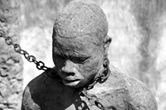
Click here to
listen to the class
Homework:
Listen
to the class and read the notes and read this article in
Wikipedia about Islamic Views on Slavery. Then answer the following
questions in no less than 600 words:
|
1. When Islam came, was slavery already existing or did Islam introduced it to the society? |
|
2. Islam has introduced a tactic to reduce the number of slaves in a Muslim Society. What was this tactic? Use the example of water tank to explain the tactic. |
|
3. What are the possibilities in handling prisoners of war? Rank them in terms of best to worst. |
|
4. To prisoners of war, slavery is an alternative to prisons. What are the advantages of slavery over prison? |
|
5. The modern example of handling prisoners of war is in Guantanamo Bay Detention Camp. Compare slavery in Islam to Guantanamo Bay Detention Camp Click here to learn about Guantanamo Bay Detention Camp from Wikipedia. |
|
|
|
6. What are the rights of slaves in Islam? Compare them with the rights of African American Slaves. |
|
7. How does Islam handle Female Prisoners of War? How was the treatment of women slaves before Islam? Compare. |
|
8. How did the American Society handled female African American slaves? |
|
9. The modern example of handling female prisoners of war is what happened in Bosnia, explain what happened. Click here to learn about Rape Camps in Bosnian War from Wikipedia (Systematic Rape by Armed Forces). |
|
10. Islam elevated the female prisoners of war who are owned by men from being a slave to being a wife. Explain how? What happens if she gets pregnant? |
|
11. Why did the European free citizens preferred to be slaves in a Muslim society rather than being free in their own home land? |
|
12. Who was Malcolm X? Why his last name is X? Briefly talk about his impact on civil rights. Use this link to read more about Malcolm X. |
Notes (1):



Notes (2):

Notes (3):
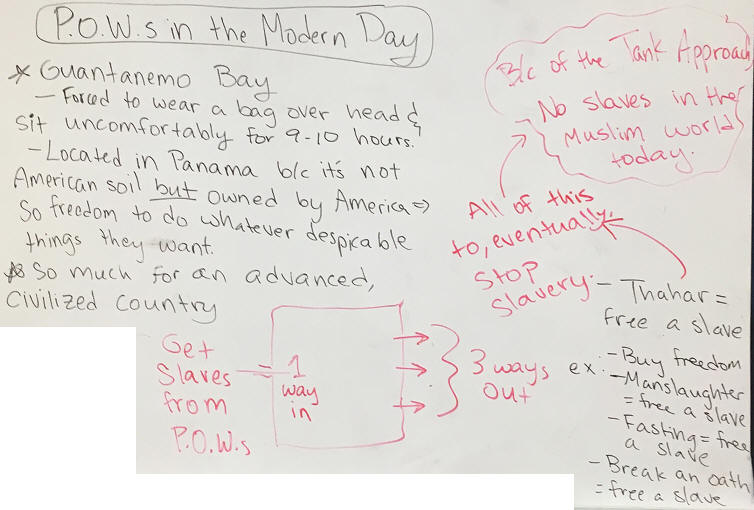





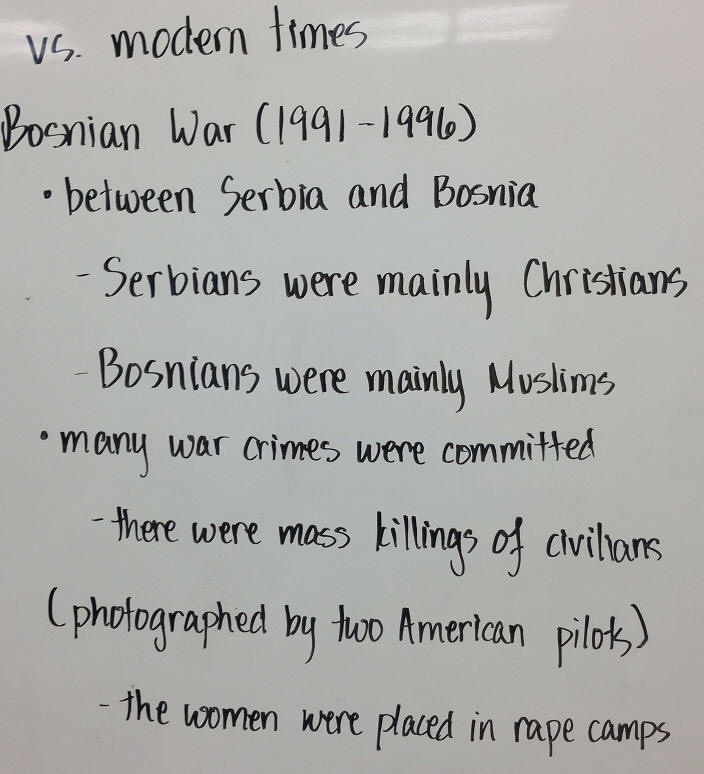


Lesson [22]: Reply to: Islam is not an American
Religion and Mohamed is not an American Name
Defending Islam against Stereotypes.


Click here to
listen to the class
Homework:
Listen to the audio recording of the class and answer the following questions thoroughly in no less than 600 words. Short answers are not accepted. You must email me the homework via email hw@zeiny.net
|
1. What are the birth area of the three religions? Is Islam the only religion imported from the middle east? |
|
2. Mohamed is not a Christian name but it is ............ |
|
3. In case of differences between Muslim American and their fellow Non Muslim Americans, the Non Muslims say go back to your country. How do you reply to that? |
|
4. Immigrant Muslims accepted to be American citizens (naturalized) when...... |
|
5. In a case of differences between main stream Americans, they do not say to each other go back to your country. Why? Do they respect each other’s opinion? |
|
6. Why “love it or leave it” is not American? What is the American attitude regarding this statement? |
|
7. You are either with us or with the terrorists (Bush). You are either with us or with the US (bin Laden). We are ........ |
|
8. Difference between propaganda and journalism (decent media). |
|
9. The main stream American media insults the intellectuals because ..... |
|
10. Natural differences intended by our creator shouldn’t be ….. |
|
11. Allah judges us for what we choose to be not what he chose for us. Explain. |
|
12. Are we democratic or constitutional republic? Explain the difference between both with examples. |
|
13. What is the American personality? What is the Islamic personality? Are they against each other or can coexist? |
|
14. Explain how the American personality and the Islamic personality can work together using the concept of pollution. |
|
15. Immigrants are tested but American born were not tested. Explain this argument. This argument is a reply to what? You may use the example of the free pens given in a medical conference. |
|
16. We don’t want Sharia. We want to ban Sharia laws. Explain who said that and how do you reply to them. |
|
17. What is the part of Sharia that are our responsibility as individuals? Is applying eye for an eye, a tooth for a tooth and a life for a life, our responsibilities to apply as individuals? Explain? |
|
18. If the law of the land prohibits Muslims from praying, fasting, pay Zakah or go to Haj, what Muslims should do then? |
Notes (1):


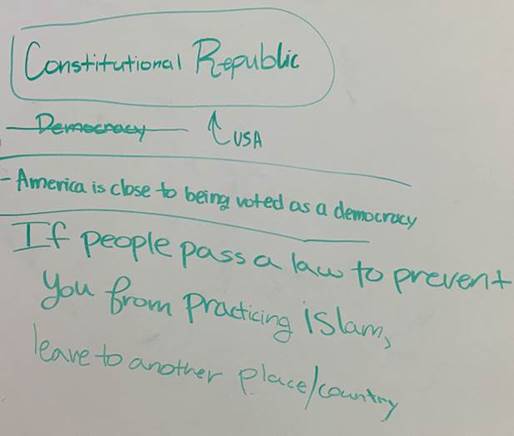

Notes (2):



Lesson
[16]: Reply to: “Islam is not civilized religion. Muslims are not civilized
people - [Part I] Analysis of the World’s Modern Civilization.”.
Are we Civilized todays?
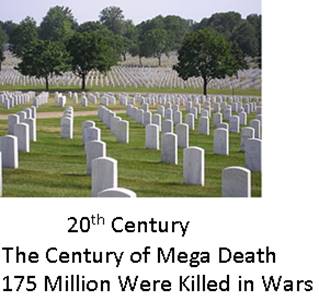
Click
here to listen to the class
Homework:
Listen to the
audio recording of the class, read the notes and then answer the following
questions thoroughly. Short answers are not accepted. You must email me the
homework via email hw@zeiny.net
Regarding the
century of mega death:
1. Describe five of the most amazing technology we have available to us today.
2.
Describe why the previous century was called the century of mega death.
Briefly summarize the number of people who were killed and the event that cause
their death. How much is the total?
3.
How long
communism lived and how many lives it took?
4.
What is the meaning
of “total war”? Who started and who continued doing it?
5.
What is the
meaning of the technology of death?
6.
What is the cause
of this mega death?
7.
The weapons we
have today, how many times they can destroy the world?
8.
Who controls the
technology of death?
9.
Why did not the
wars in the past consume even a small fraction of what were killed in the past
century?
10.
Describe the
similarity between a person playing video games and a pilot bombing a city?
11.
What is carpet
bombing?
Regarding
inequality of the distribution of wealth and power
1.
Describe the
global inequality? Compare the wealth of minority to the wealth of majority?
Give numbers.
2.
Describe the
local inequality in the distribution of wealth in the U.S. Give numbers.
3.
Describe the
global inequality in the distribution of wealth in the world. Give numbers.
4.
What was the
ratio of the average income of a person in the poor world and the rich world in
the eighties and nineties? Is the ratio growing or declining? Use the data
published by the united nations human development reports.
Regarding
Hollywood and the entertainment industry
1.
Describe how the
television affects the growing mind of the young kids in terms of values, what
is right and what is wrong.
2.
Mention the data
from Nielsen Media Service regarding the hours spent watching television for
different kind of people.
3.
Why is many of
the movies have lots of profanity, brutality, violence and vulgarity? What is
the motive behind this?
4.
How much is the
total export hours of U.S. movies and media as compared to the rest of the
world?
5.
How many
countries imported the television series “Dynasty” and “Dallas”? How bad are
they?
6.
What are the
American movies teach people of other nations about the United States?
7.
What are the
problems resulting from the characteristics of the current movies and series?
8.
(Optional) Many
poor people feel miserable when they see the luxury of the rich. What makes
this factor worse today than the past?
Your
Judgment
In
your opinion what do you think about the current civilization? What do you
think about the technology versus the civilization? Can be civilized poor
people with no technology? Can be uncivilized rich people with marvelous technology?
Notes:
Lesson
[18]: Reply to: Islam Is Not Civilized Religion - Muslims Are Not Civilized
People - [Part II] Criteria to Measure Civilization.

Click here to
listen to the class.
Homework:
The following is the Islamic
criteria to judge civilizations. In 600 words or more, talk about each
criterion and explaining why is it an important criterion and how does it
affect civilization.
1. Highest Value of the society.
2. Source of Legislation.
3. Role of women.
4. Building Unit of the Society.
5. Bases of Unity.
6. Inequalities.
Notes:
Click here for the written notes.

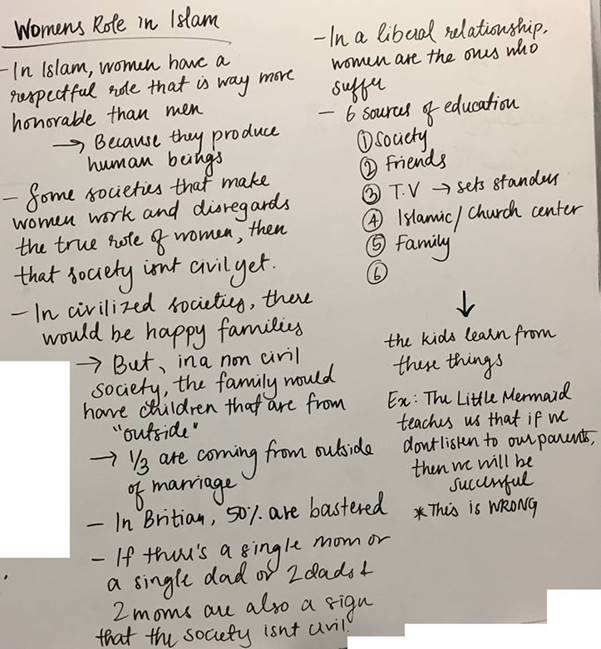
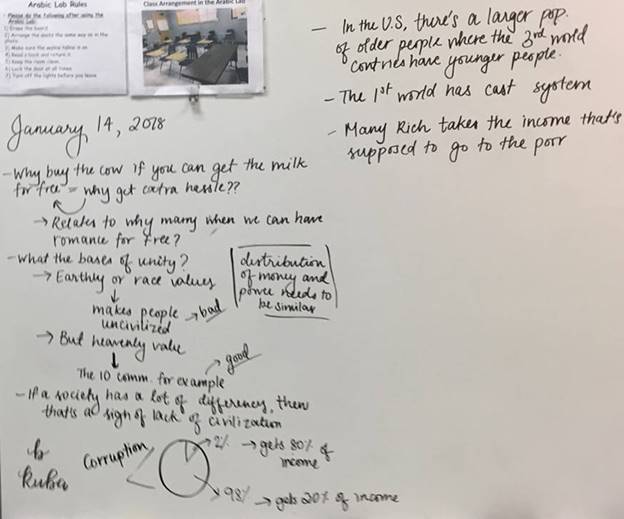
Last Year’s Notes:
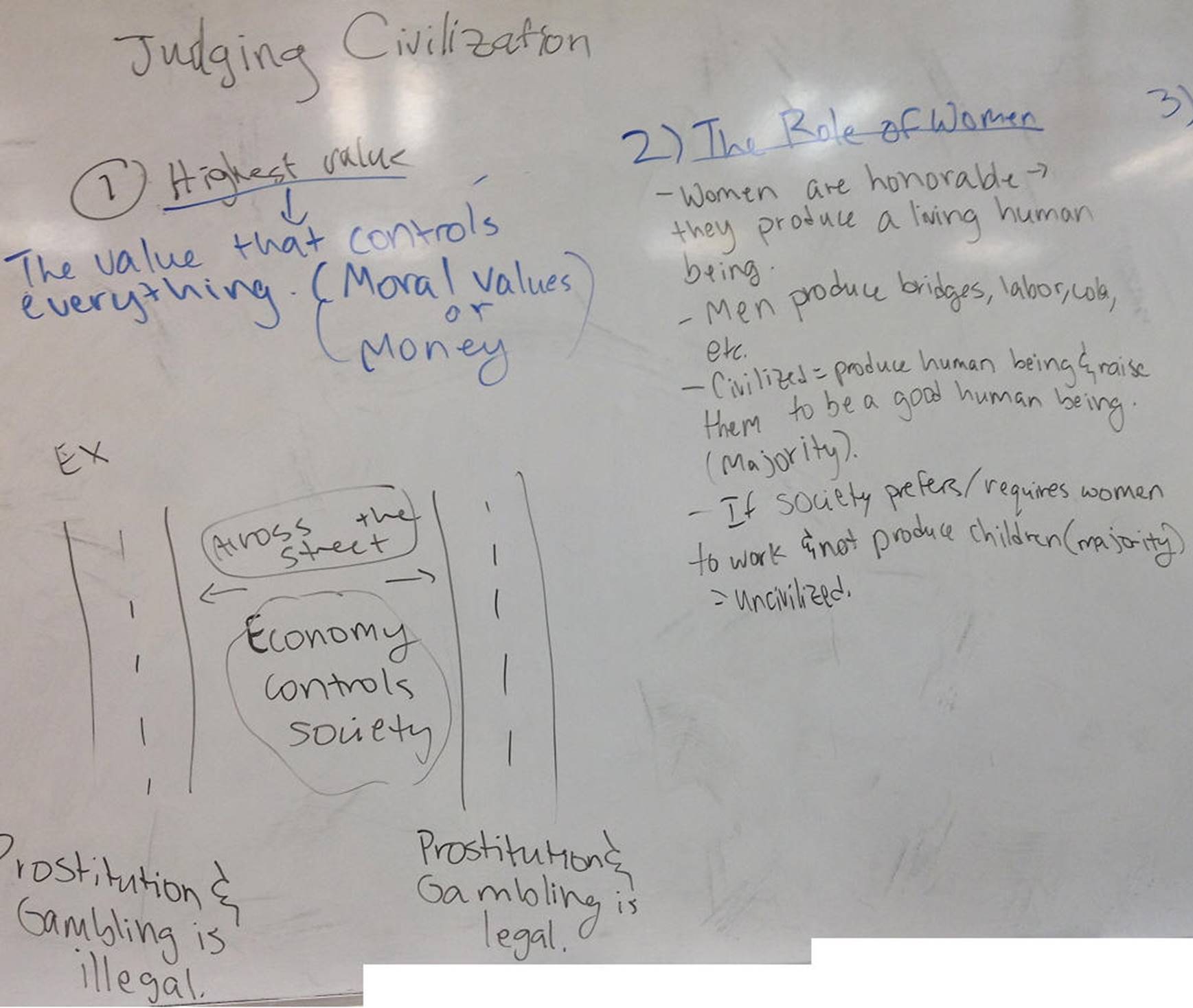
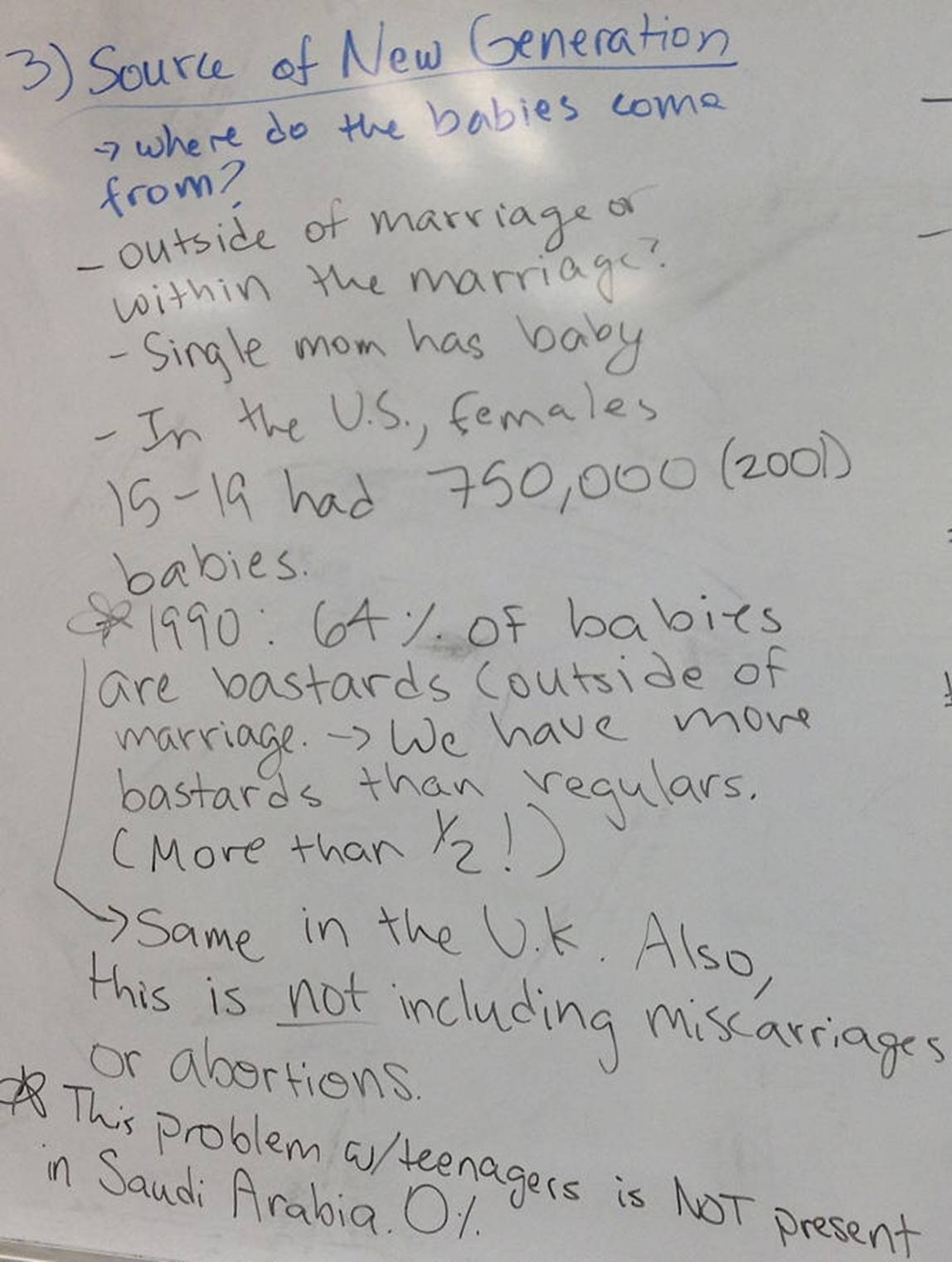
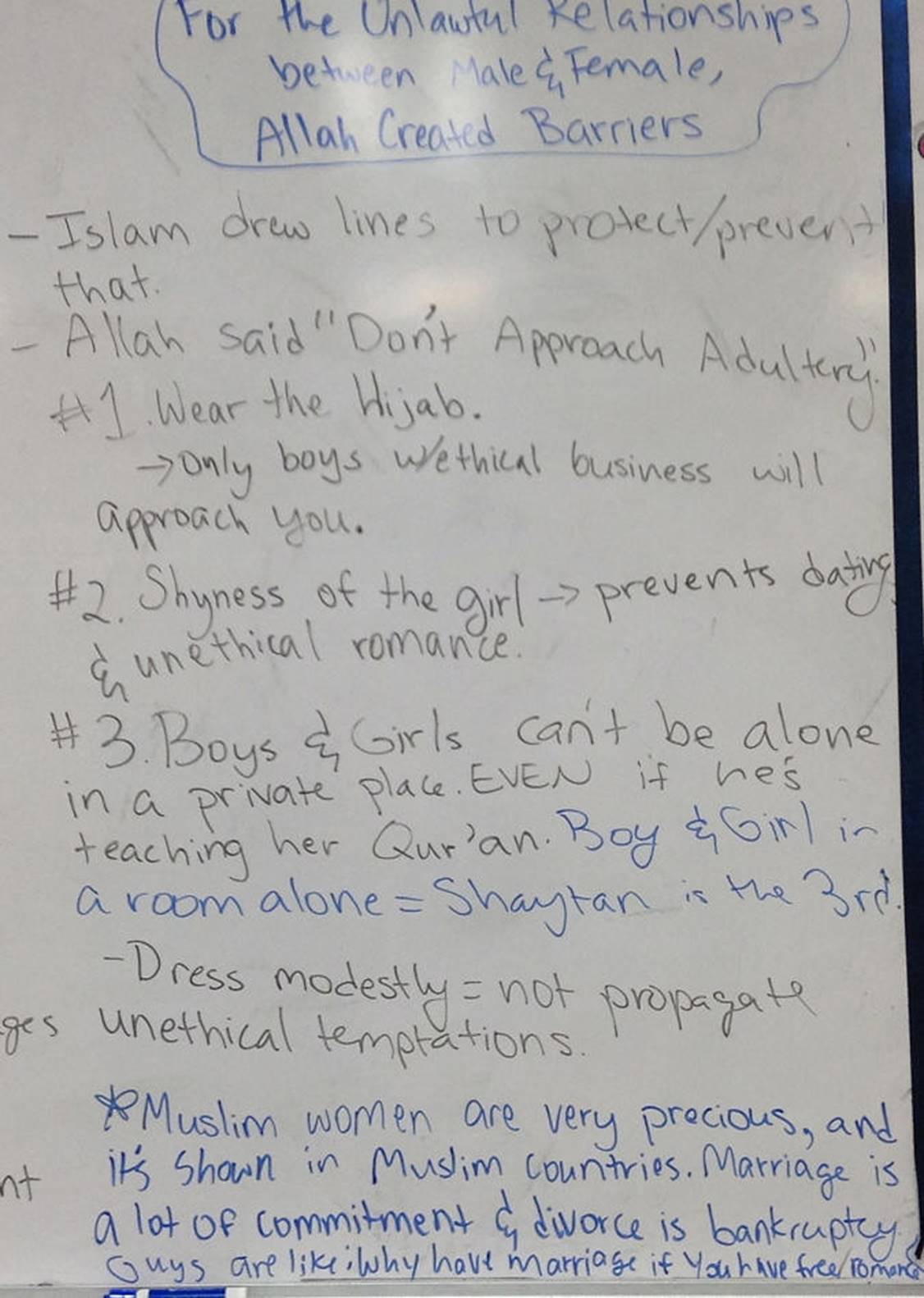


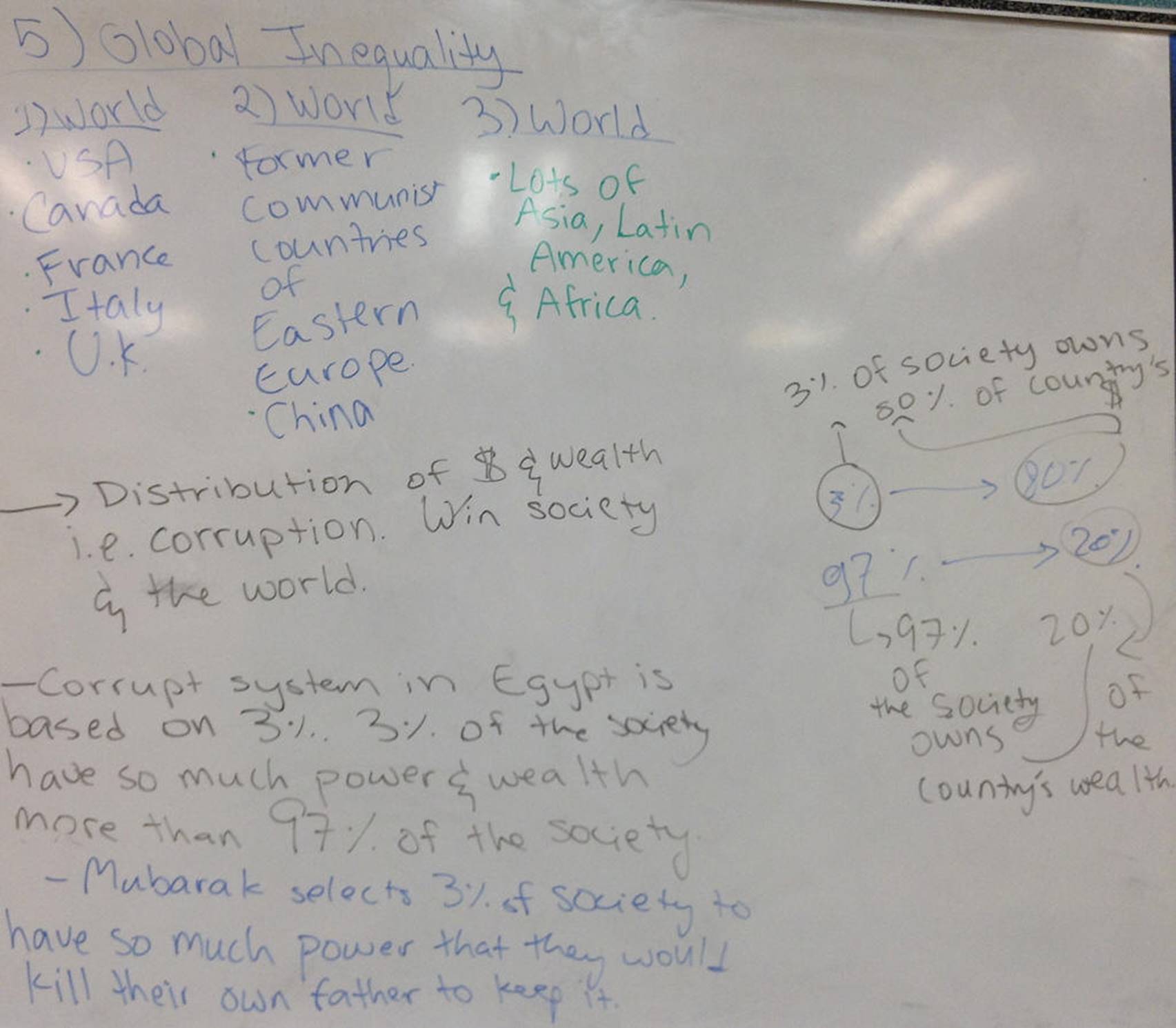
Lesson
[25]: Hadeeth of Intentions Part II.
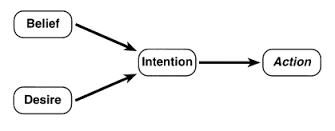

Click here to listen to the class.
Homework:
1. Explain why the intention's hadeeth is 1/3 of Islam that the other
2/3 are no good without.
2. Similarity of hearts: How come Allah blamed the Jews who fought
Prophet Mohamed SAW for the mistakes of their predecessors? How is that fair?
3. Many people have evil intentions. Would Allah allow all of them to
do what they intended? Why or why not.
4. Why The intention of the believer is better than his/her deeds and
the deeds of the hypocrite
are better than his/her intentions
5. If you pray Fajr every day and one day you are sick. Would Allah count
the sick day as prayer in the Masjid?
6. You don’t pray Fajr in the Masjid when you are not sick, then do
you get rewarded for praying in the Masjid when you get sick?
7. Why would Allah send believer to Jannah for everlasting life when
they have worshiped Allah for a limited time period?
8. Why would Allah send bad guys to hell for everlasting life when
they have disobeyed Allah for a limited time period?
9. What do you say if someone gives you a compliment?
10.
Are we allowed to
judge the intentions of others? Why or why not. Mention the story of the companion who killed a pagan guy after
he said Shihada.
11. Do Angels know the intention and write it down?
12. Explain the story of the Shytan and the righteous slave who wanted
to cut a pagan tree.
13. What if someone wanted to do a good deed then he changed his mind?
Explain.
14. What if someone wanted to do a bad deed and then changed his mind
for the following reasons
(a) Fear of Allah. (b) Not
good for health.
15. What if someone wanted to do a bad deed in Makkah and then changed
his mind because it is not good for his health.
16. Situations
where we are not judged for what we do. Are we judged for mistakes, for
forgotten, and for innocent errors?
17. Explain the rule of
combining intentions. If someone intends to go to the Masjid to pray and to buy
milk on the way back, is this a sincere intention or a bad intention?
18. Can someone intend to go
to the Masjid to pray and to show off?
19. Can we combine two good
intentions in the same deed?
20. Can we combine bad
intentions with good intentions in the same deeds? explain.
21. Guarding the intention. The intention can be spoiled before the
deed, during the deed or after the deed. Give examples.
22. Explain the following
rules of combining intentions. For examples, going to the Masjid to show off
and pray, or going to the Masjid to pray and eat food offered in the
Masjid. B+G=? G+G+B+G=? B+G+G+G=? If you
know the Hadith that proves your answer, then mention it.
23. Which intention governs, before, during after?
|
Before
Deed |
During
Deed |
After
Deed |
Final
Results |
|
Good |
Good |
Good |
? |
|
Good |
Good |
Bad |
? |
|
Good |
Bad |
Good |
? |
|
Bad |
Good |
Good |
? |
|
Bad |
Bad |
Good |
? |
|
Bad |
Good |
Bad |
? |
|
Good |
Bad |
Bad |
? |
|
Bad |
Bad |
Bad |
? |
24. never regret a good deed that you did in the past. Is it true or false? Explain.
Notes:
Lesson [23]: Sunah and Bida’a (Innovations) - Legal and Illegal Changes.
 \
\
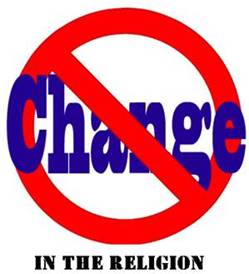
Click here to listen
to the class.
Homework:
Listen to the audio recording of the class and answer the following questions thoroughly in no less than 600 words. Short answers are not accepted. You must email me the homework via email hw@zeiny.net
1.
The word Sunah has many
meanings. What are they?
2.
Explain the meaning of Bida’a as an opposite to Sunnah. How does
Bida’a divide the Muslims?
3.
Can I put my hands behind my
neck during the prayer? Why?
4.
Can I go to the Masjid driving a
car instead of riding a camel or horse? Why? Can I pay my Zakah using a check
or a credit card? Why?
5.
How many Sunni schools (Mazhab)
or Traditions? Name them. Give two examples of differences between them?
6.
Differences are divided into
legal and illegal. Explain what makes a difference legal and what makes in
illegal and give couple of examples of legal and illegal differences.
7.
Mention the story when the
Prophet Said “Whom believes in Allah and his Prophet shouldn’t pray Asr except
in Bani Qoraiza”. What was the comment of the Prophet on both interpretations?
8.
Is Tahara and cleanness the
same? Can you be Tahir but unclean? Give examples.
9.
Is there only one way to make
Iqama? Mention some of the differences, if any.
10.
Is saying Amin after Fatiha
loudly correct? Is saying it quietly correct? Is the difference here legal or
illegal, if any? Explain?
11.
Is praying with you shoes on
Sunnah or Bida’a? How about praying without Hijab for girls? How about for boys
who pray with shorts above the knee? Explain.
12.
How many ways we can recite
Quran? Give an example from Surat Al-Fatiha. Compare the meanings to each other
to see if they complement or oppose each other.
13.
Do the different ways of reading
Quran give you meanings that complement each other or oppose each other? Give
examples from Surat Al-Shams?
14.
How many ways we can make Iqama?
How many “Allah Akbar” do we say in each way?
15.
Is covering the face sunnah or
obligatory? Mention the position of the four Mazhub (schools or traditions). Is
this difference legal or illegal?
16.
(Optional)What is the secret
formula? Are they allowed in Islam? Make up an example of secret formula. How
do you reply to the ones who argue that it is part of the religion?
17.
Some of the Sofi schools teach
making Thikr by singing and sometimes dancing? Is this Bida’a or not? Why or Why
not? How do you reply to someone who says it is okay?
18.
(Optional)Give two jokes about
Sheikhs who pretend to have special powers?
19.
(Optional)In the Sofi tradition,
can you question the Sheik about his decrees? Is this Sunnah or Bida’a?
Explain.
Notes:


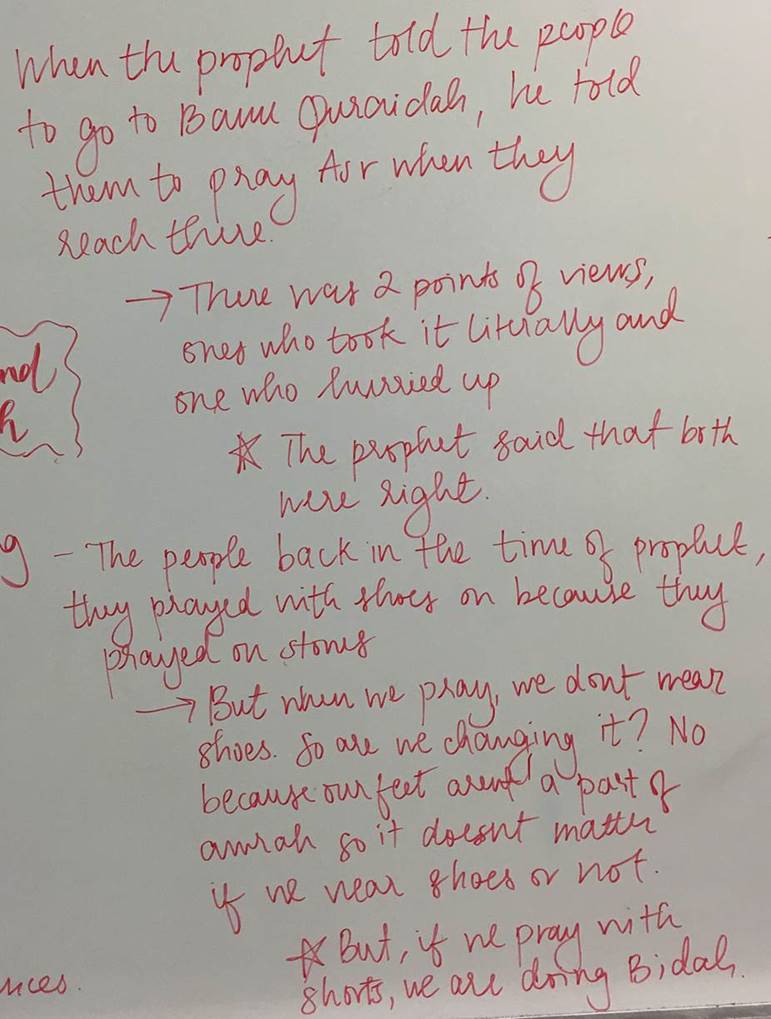
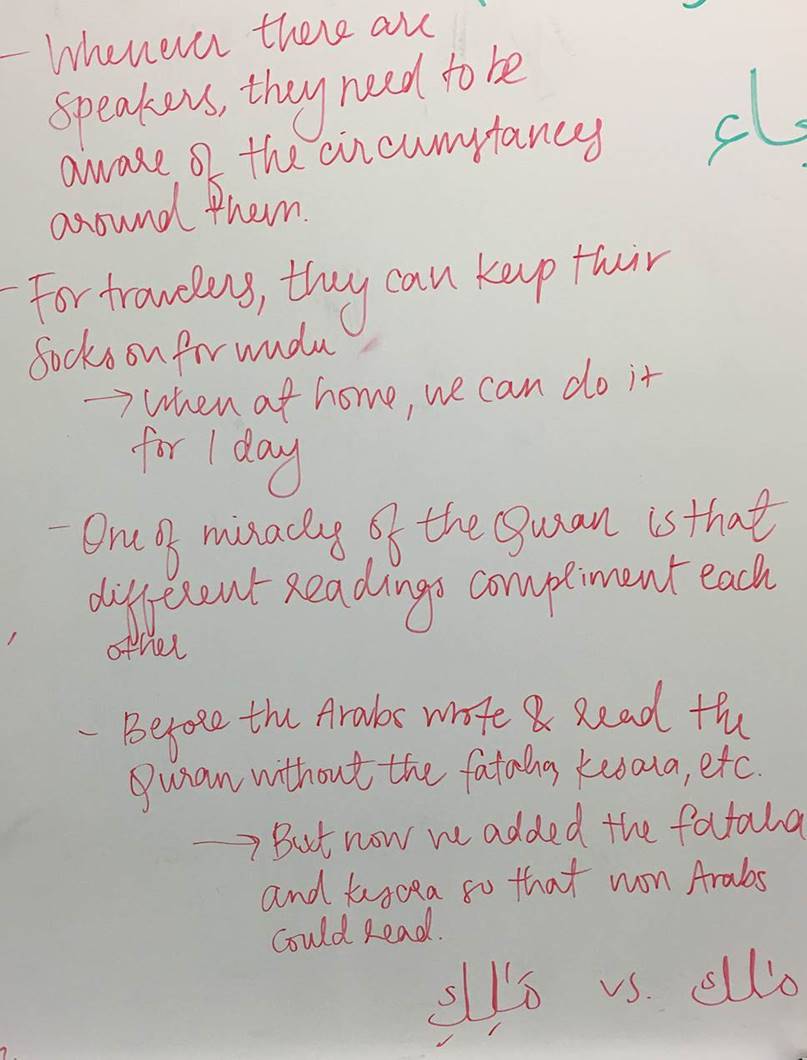
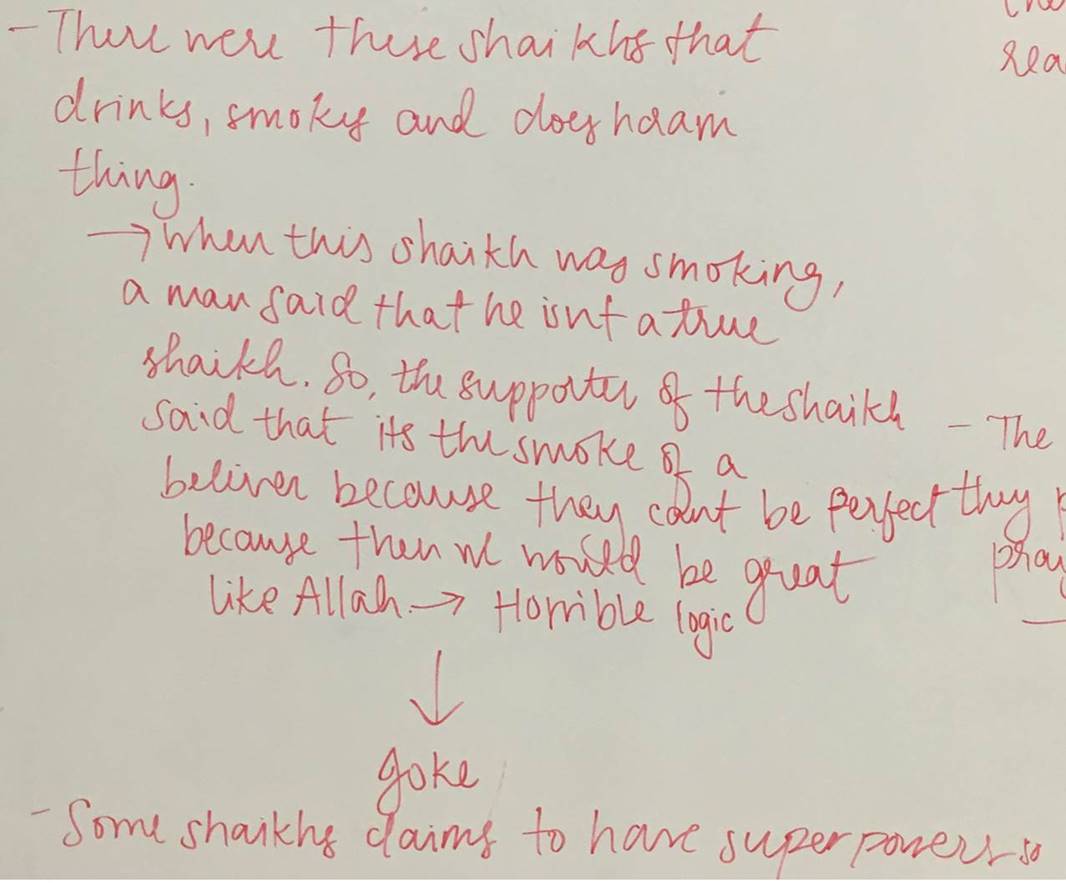
Lesson [24]: The Hadeeth Collections: Hadeeth of Intentions Part I:
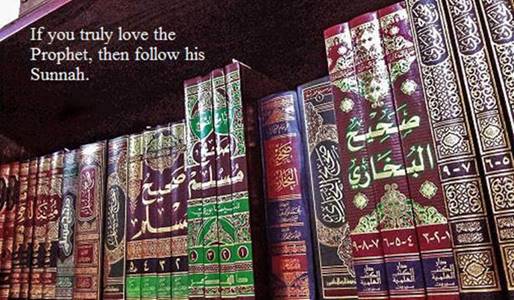
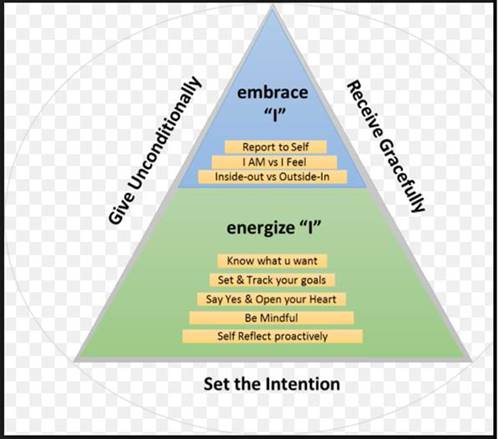
Click
here to listen to the class.
Homework:
Listen to the class and read the notes, and then in no less that 600
words Answer the following questions. Short answers are not accepted. Send me
the homework via email hw@zeiny.net
1.
Were the Sunnah /
Ahadeeth of the Prophet written when he was alive? Why?
2.
Talk about the
life of Imam Bukhari. You can use this link or your own sources.
3.
Explain how Imam
Bukhari authenticated the Ahadeeth of the Prophet? Mention the example of the
person who cheated the camel?
4.
What is the
Hadith of intention? Explain the Hadith and mention the story of the guy who
wanted to marry Um Qays.
5.
Mention the two
jokes mentioned in the class regarding intentions?
6.
If forty people
who did not know each other narrated one Hadeeth, would it be accepted as
authentic? Explain.
7.
What is the order
of the Hadith of intention in the book of Imam Bukhari?
8.
Explain why the
intention's hadeeth is 1/3 of Islam that the other 2/3 are no good without.
9.
Explain how one
is rewarded for a deed and the other one is punished for the same exact deed.
What is the difference between them that caused one to be rewarded and the
other to be punished?
10. Do angels know the intentions? What do they record?
11. Explain the Hadeeth of the four categories of people. Relate them
to the intentions.
Notes:
(optional) You may also use the
following document as a reference.
The HADITH - How it was Collected and Compiled.
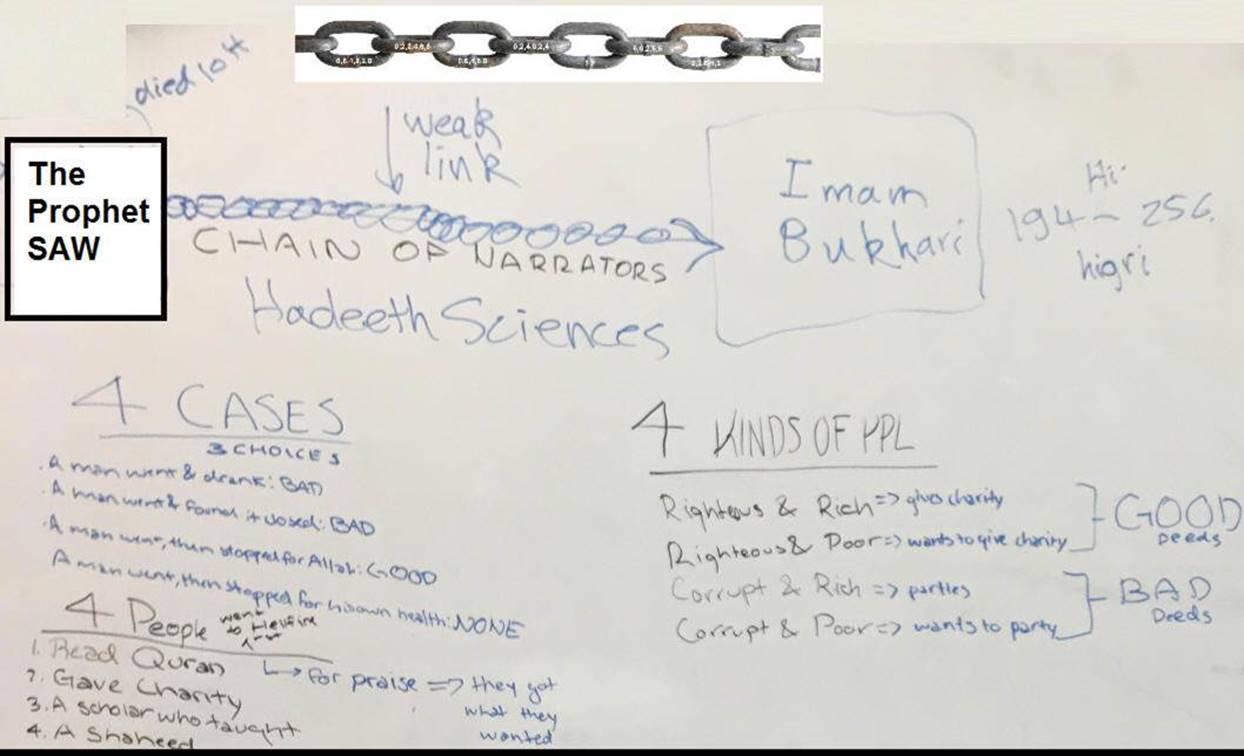
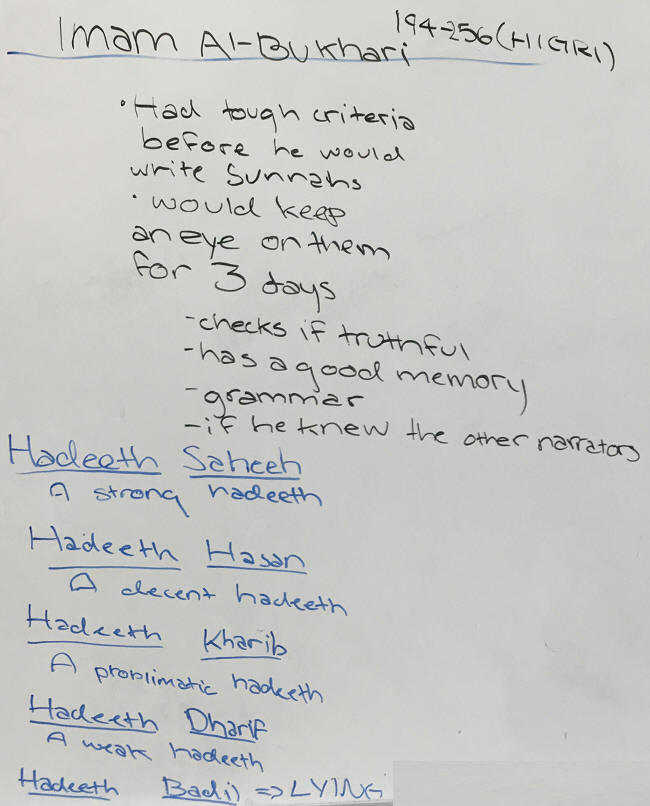
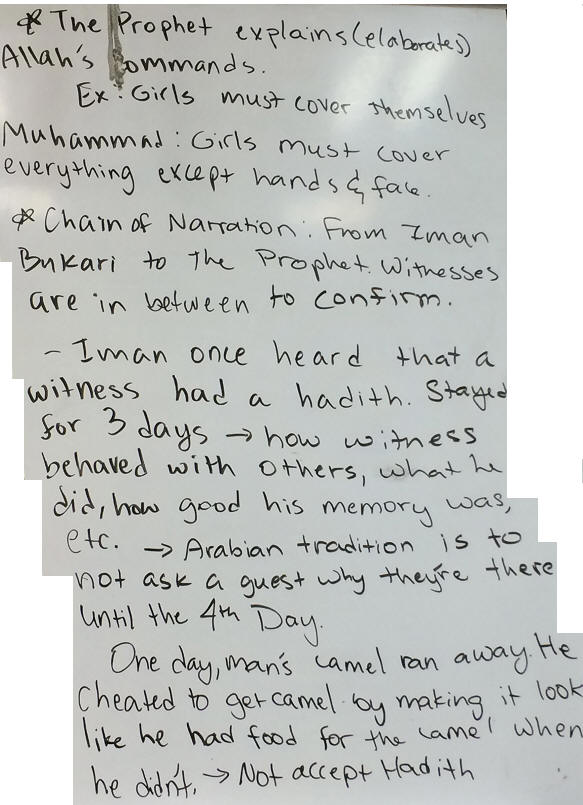
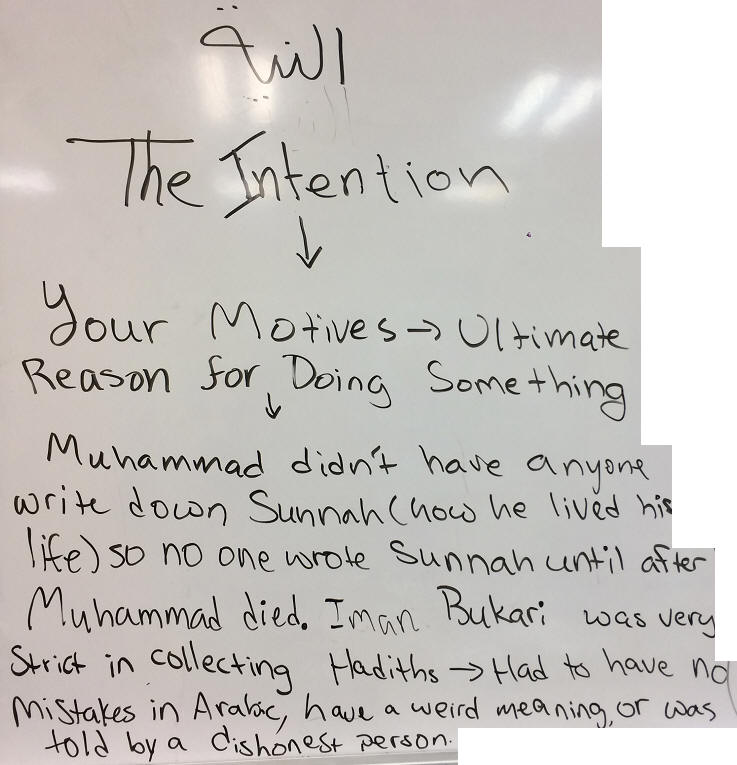
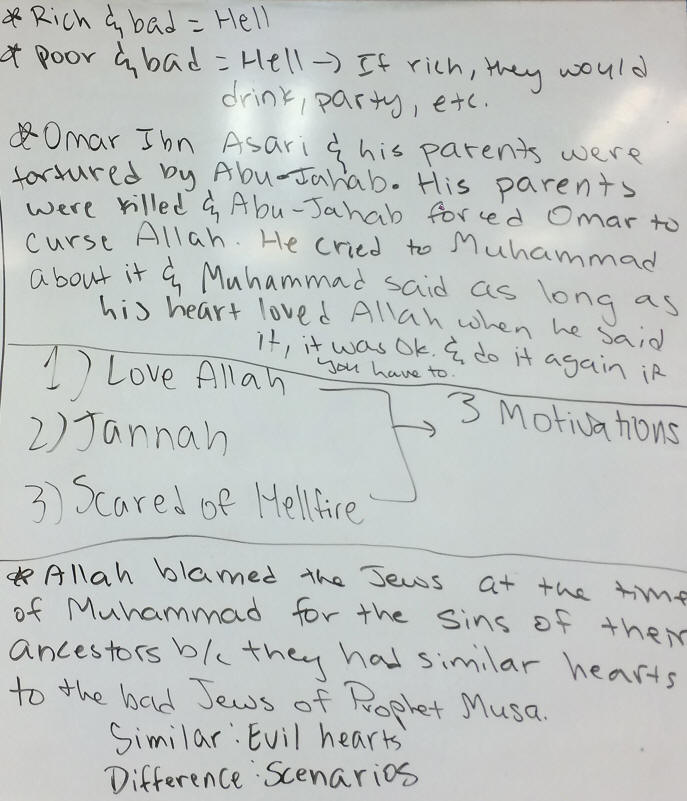
Lesson [26]: Doing Business with Allah

Click here to listen to
the class.
Homework:
Listen to
the class and read the notes, and then in no less that 600 words Answer the
following questions. Short answers are not accepted. Send me the homework via
email hw@zeiny.net
1. Explain how did Allah give you the blessings of body and money
without charging you any money and then he is asking you to give back to him
from that which he gave to you for free.
2. Hasan Al-Basry was once asked why people hate death so much, what
was his answer?
3. What happened if you are deported to a land that you have no assets
or money invested in this land? Compare this when we are deported by the angel
of death.
4. Give five examples of how to do business with Allah.
5. How is doing business with Allah different than doing earthly
business with others?
6. Did Allah ask us to loan him money? Explain.
7. Mention the story of the Sahabi and his garden.
8. The Prophet SAW sweared by Allah that the charity doesn't decrease
the wealth. How is that possible? Give examples.
9. Allah sweared by himself that our shares are predetermined in
heaven. Explain how is this related to the subject.
10. If you
don't want many children because you can't afford them. Explain how is this
false?
11. What happened
to the disobedient slave who used to say to Allah "Ya Allah, how many
times I disobey you and you never punished me"? Explain the story.
12. Explain
the Hadith when the Prophet SAW asked his companions "Who is the
bankrupt?" what was the answer and how is it related to the subject?
13. There are
recommendations regarding doing business with Allah related the sources of good
deeds, mention one and explain it.
Notes (1):
Click
here for the written notes.
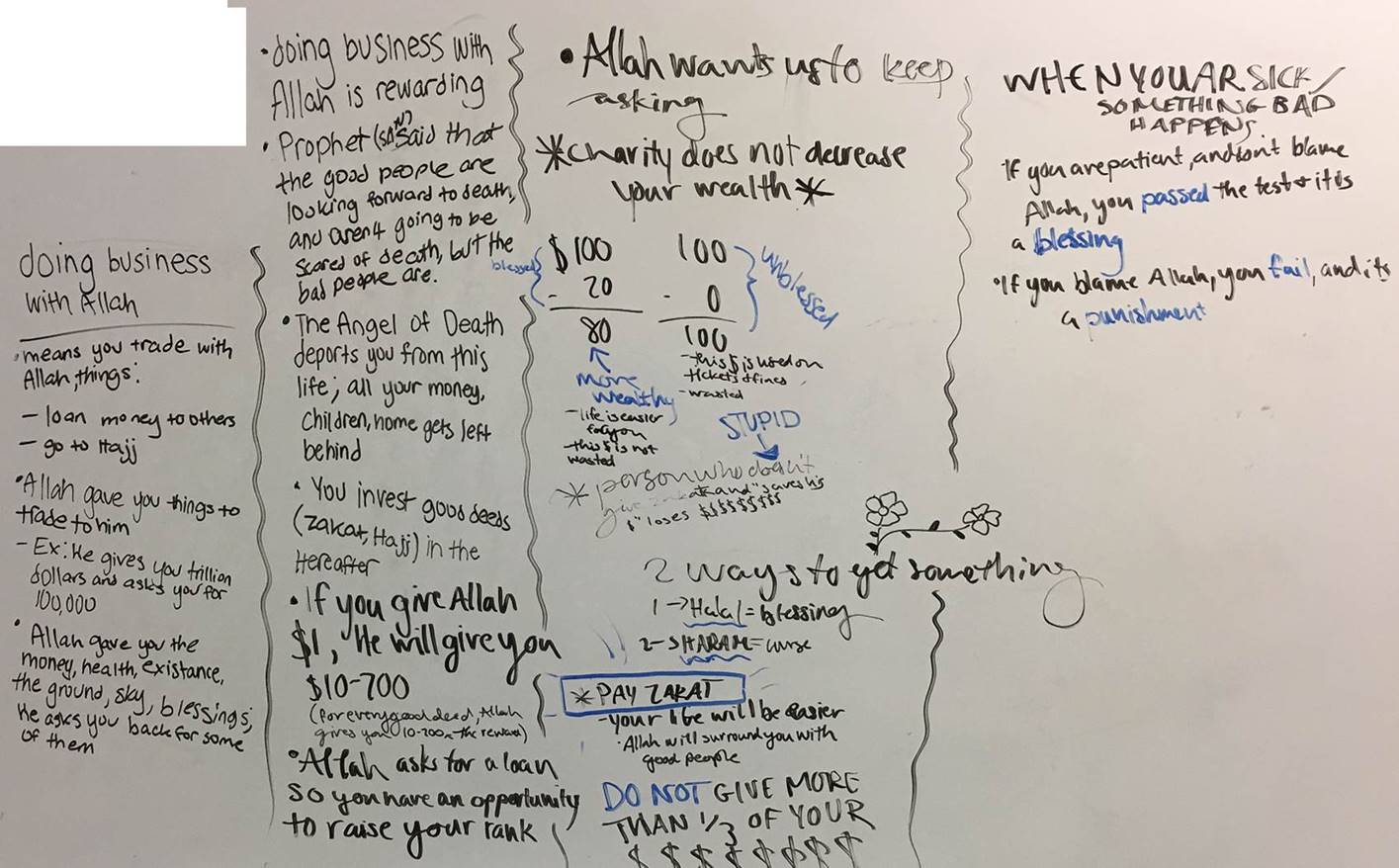
Notes (2):
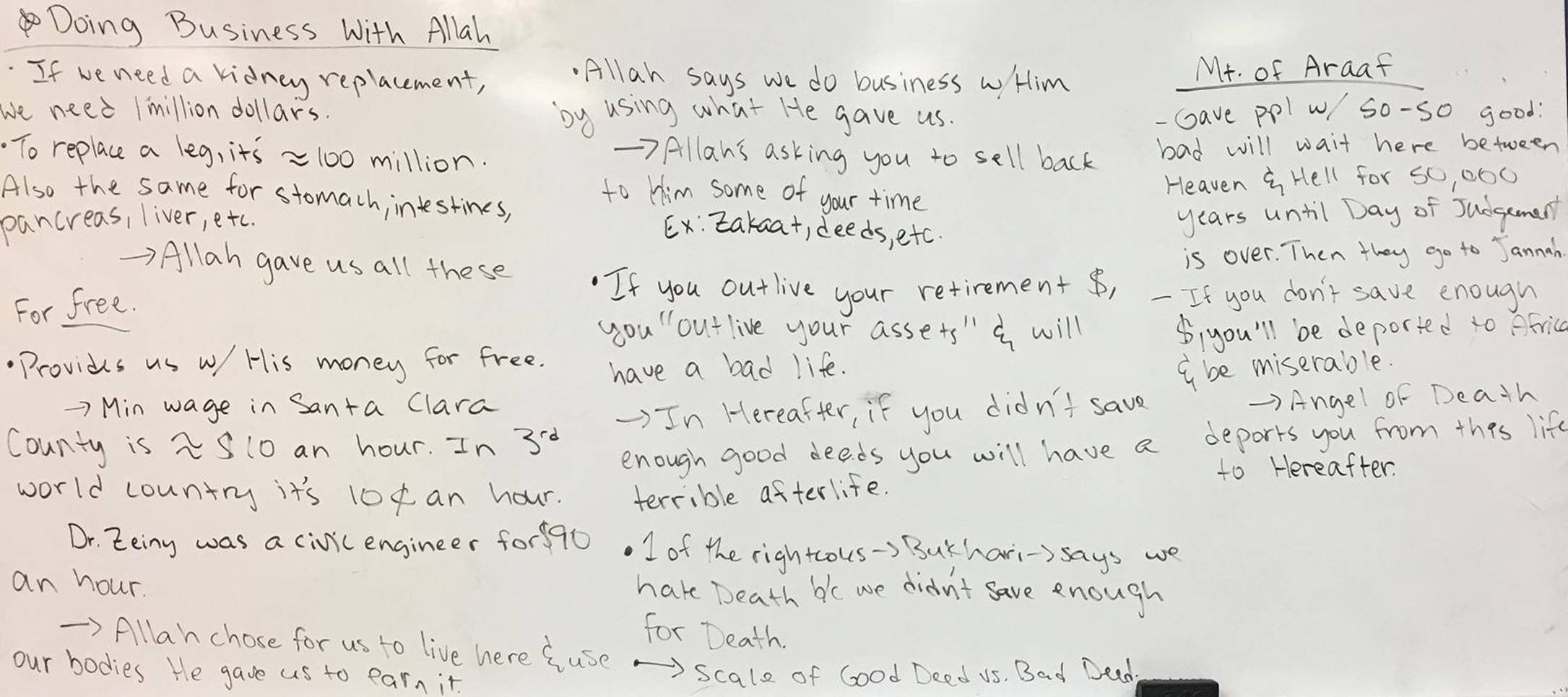
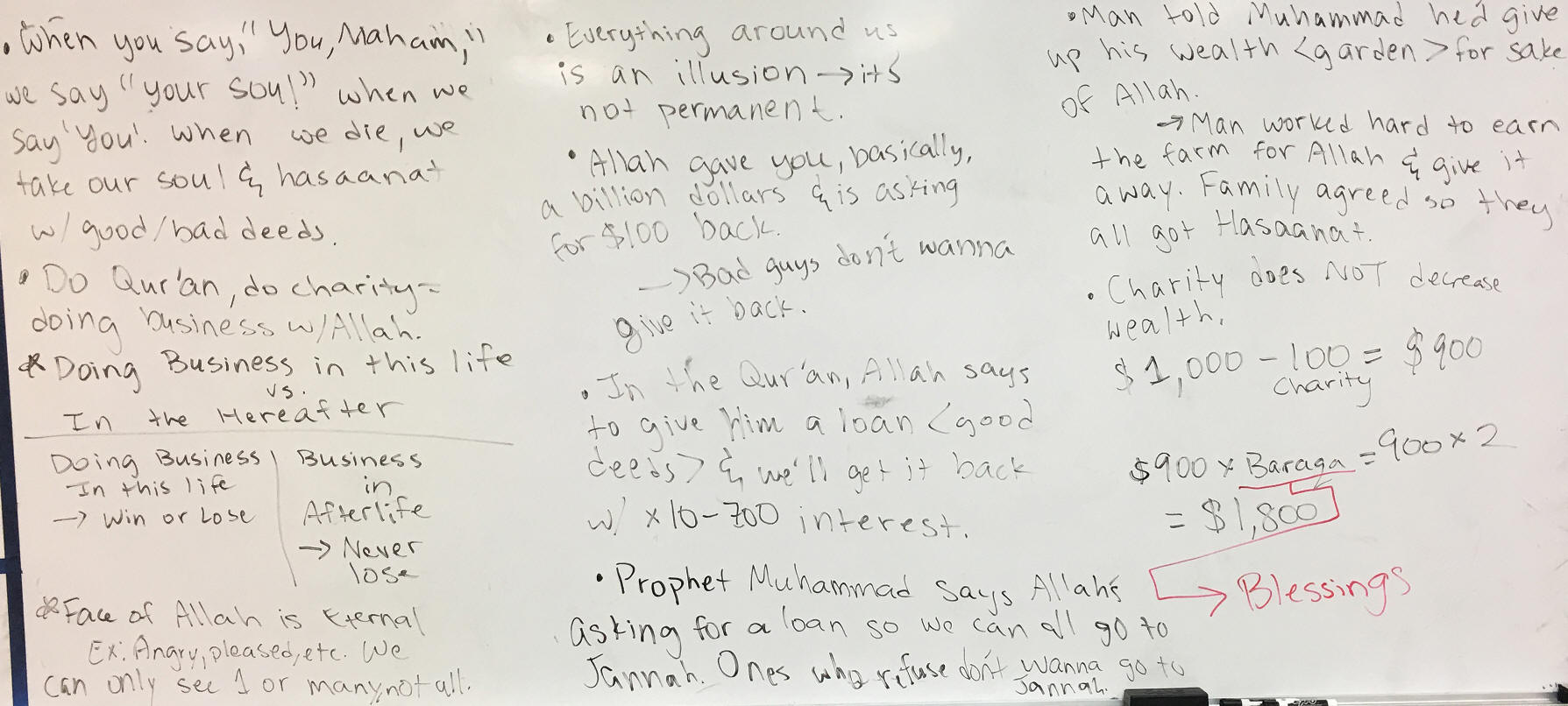
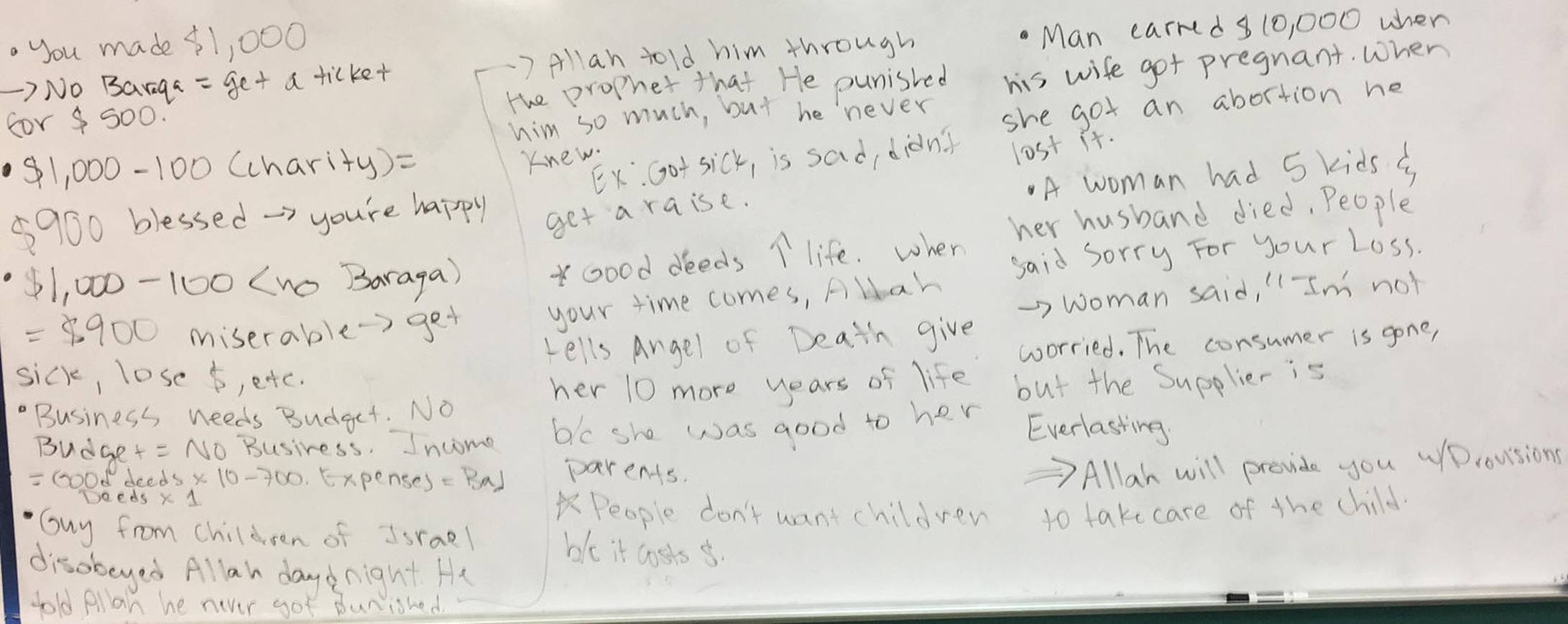
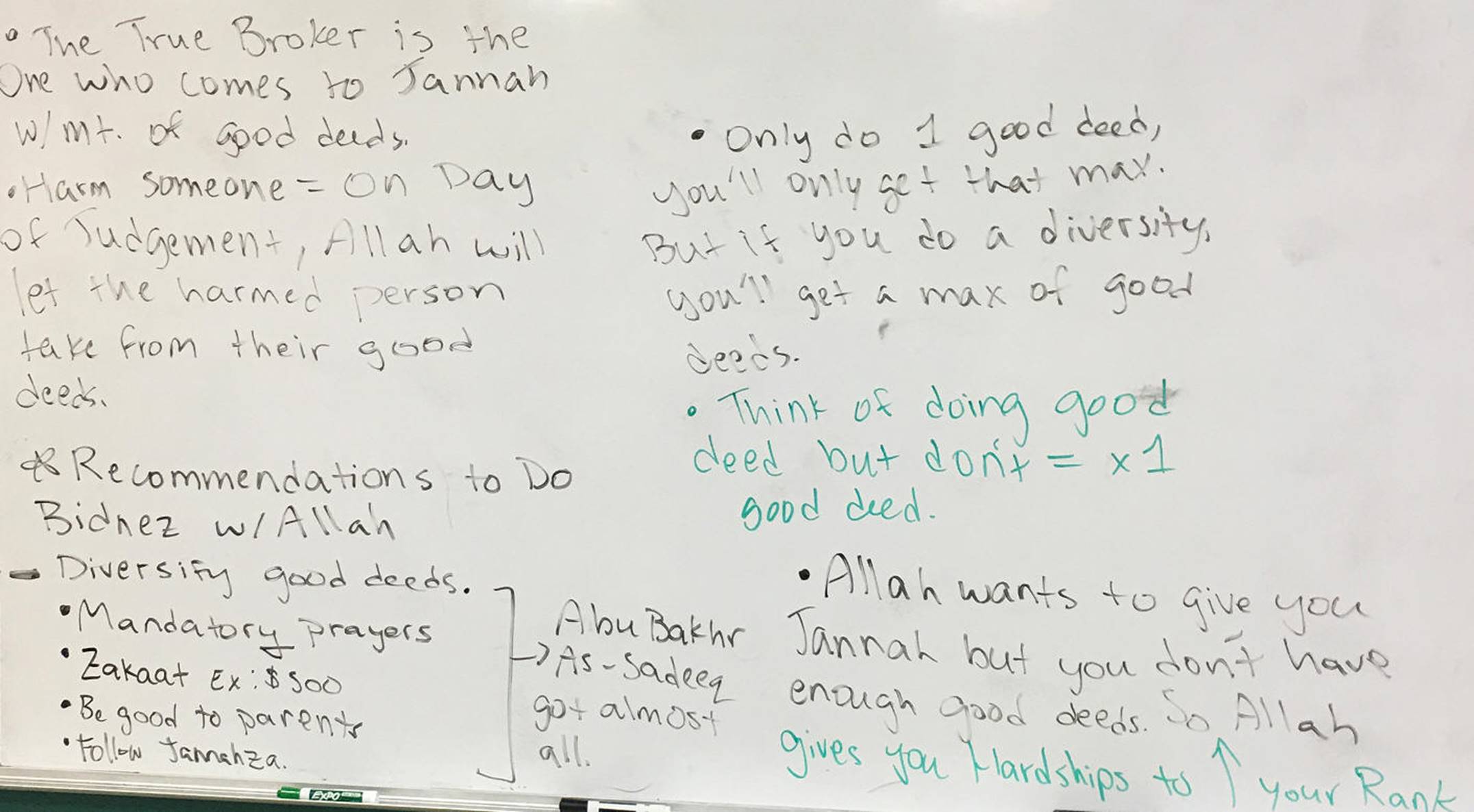
Lesson
[27] Lessons from COVID-19 Crisis – By Sheikh Dr. Yasir Qadhi.


Seven Lessons from the Crises of Coronavirus (COVID-19) by Shaykh
Dr. Yasir
Homework:
Listen
to the lecture and explain the seven wisdoms that come from the crisis.
Add one of your own.
Lesson
[28] The American Dream – By Sheikh Dr. Yasir Qadhi.


Homework:
Listen
to the lecture and answers the following questions.
1.
Why did Allah
describe all the ones who did not answer his call to be people as cattle and
worse than cattle.
2.
About the
pleasure of the stomach and the pleasure of the body:
a.
Are they
important, not important or don’t matter? Explain your answer.
b.
Are they the
purpose of life? Describe the kind of the people who say and the ones who say
no.
c.
Is there a higher
purpose of life? Explain.
3.
What exactly the
American dream.
4.
Is really there a
higher power, a supreme power or a God?
5.
How many people
in the world they don’t associate themselves with organized religion?
6.
What is the watch
maker argument about the existence of God? Explain it.
7.
What is the
morality arguments argument about the existence of God? Explain it.
8.
Do people search
for a deity to commit to? Give examples.
9.
Let us say there
is a God, how do we know that he knows about us and care about us? How do we
know that he is a loving God? How do you argue this to others?
10. How do you explain the existence of harm and evil?
11. When the people of Europe and the United States reject religion,
are they rejecting Christianity or Islam? Clarify.
12. The glory years of Muslims did they happen in the presence or
absence of Islam? Explain.
13. After listening to the lecture, tell me why Islam out of all these
religions?
Lesson
[29] Surat Al-Baqara 1

Click
here to listen to the class.
You can use Quran Explorer to
lookup the mentioned Ayat
Homework:
Read the notes (2 sets of notes), listen to the recording and then
in no less than 600 words Answer the following questions. Short answers are not
accepted. Send me the homework via email hw@zeiny.net
1. What
is special about Surat Al-Baqara in terms of length?
2. Where
the name of the Surah come from? Mention the story. Mention the Ayat numbers
that talks about the story.
3. How
many kinds of guidance we have? What are they? Explain them and use examples.
4. At
the end of Surat Al-Fatiha, who are الضالينAl-Daleen and who
are المغضوب عيلهمAl-Magdoob
Alyhm? Give examples of each.
5. Explain
the similarity between someone who knows the truth but don't want to follow it
and the one who is trying to lose weight.
6. The
Surah speaks about four kinds of people. Who are they and how many Ayat were
assigned for each kind. Mention the Ayat number.
7. Why
the hypocrites were described using more Ayat than the other two kinds.
8. Why
did 1/3 of the Surah dedicated to talk about the Jews who denied the message of
Prophet Mohamed SAW?
9. What
do you learn from Ayat (6:20) and (2:75) about the Jews?
10. What
is the story mentioned in Ayah (2:89).
11. Why
did Allah blame the Jews who denied that Prophet Mohamed is a Prophet for the
mistakes of the early Jews who worshiped the kaaf and killed the Prophets?
12. Mention
the reasons for which the Jews rejected the Prophet SAW despite the fact that
they had detailed description of him in their book. Hint use Ayah (2:90).
13. Describe
the link between Ayah (1:6) in Surat Al-Fatiha and Ayah (2:2) in Surat
Al-Baqra.
14. In
Ayah (2:7) Allah said that he sealed the hearts, the ears and the eyes of the
non-believers so that they can't see the truth. How is that fair? Why didn't
Allah open their hearts, ears and eyes instead of sealing them.
15. What
is the story about the last two Ayat in Surat Al-Baqra?.
16. Why
does the hypocrites believe that righteous people are idiots? Mention examples.
Hint: you don't know what you are missing.
17. Mention
the illustrative examples mentioned about the personality of the hypocrites.
Hint: one is related to the fear of making a commitment and the other is about
plugging their ears.
Notes (1):

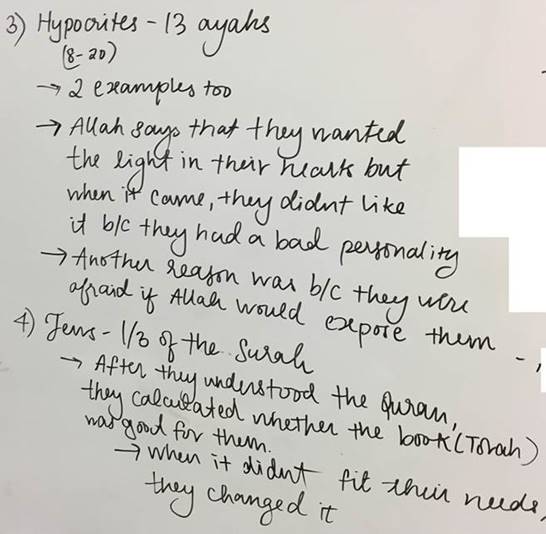
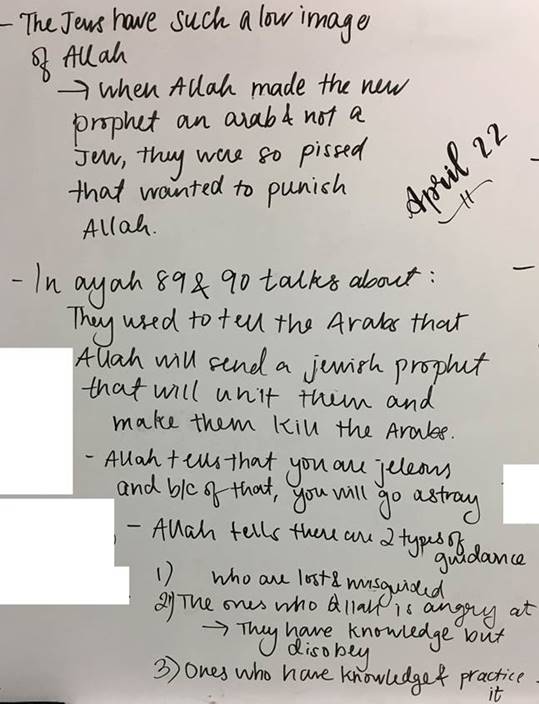
Notes (2):
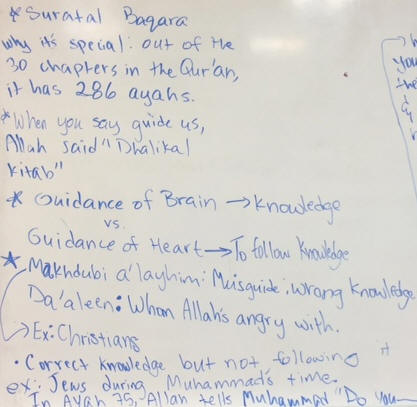
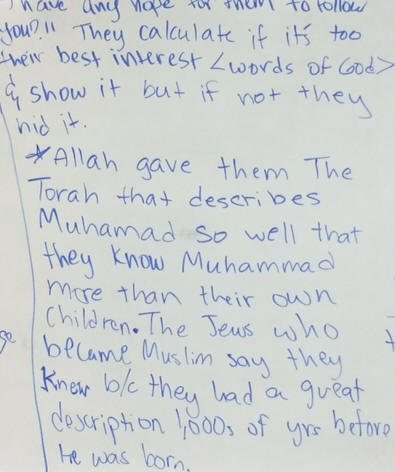
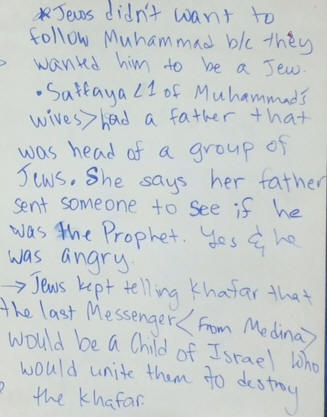
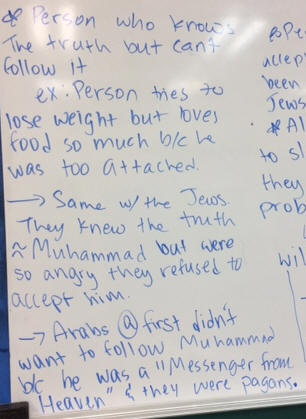
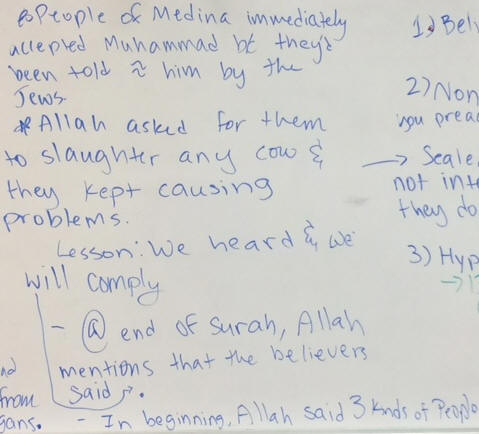
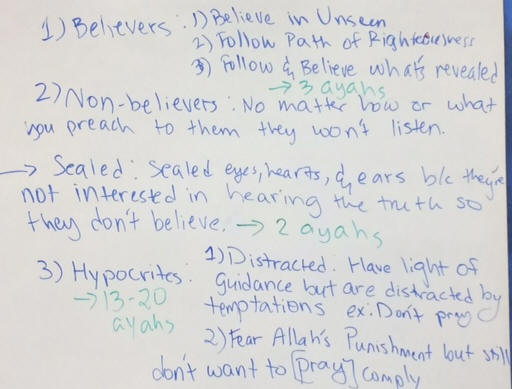
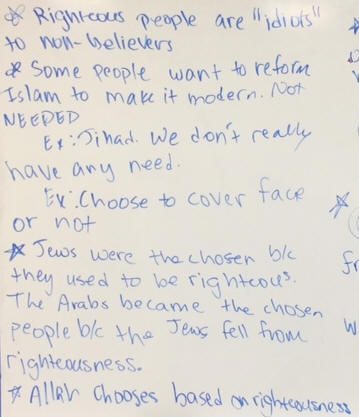
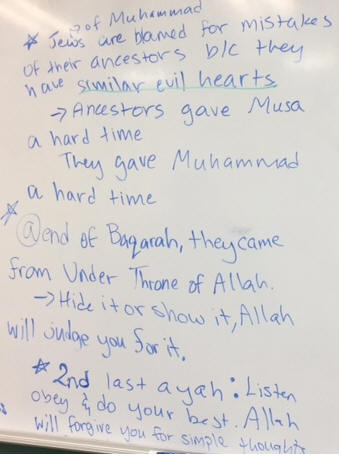
Lesson
[30] Surat Al-Baqara 2
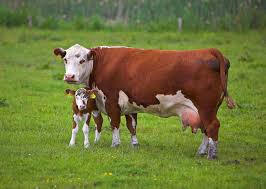
Click
here to listen to recording of the class.
You can use Quran Explorer to
lookup the mentioned Ayat
Homework:
Read the notes, listen to the recording and then in no less than 600
words Answer the following questions. Short answers are not accepted. Send me
the homework via email hw@zeiny.net
1. Explain
the story in 2:102, what was the Shytans recite about the royal powers of
Suliman? Who are Haroot and Maroot mentioned in the Ayah?
2. How
is black majic done?
3. Before
the birth of Prophet Mohamed SAW, could the Shytans sneak to heaven and listen
to the talks of the angels? What happened after the birth of Prophet Mohamed
SAW.
4. What
is the nature of Jinn? How can they make themselves visible to us.
5. How
is the Jinn able to bring the thrown of Balqis from Yemen to Jerusalem?
6. Mention
the story of Taloot and Jaloot (Goliath) and how Allah filtered the army
soldiers to weed out the weak ones. Who killed Jaloot? The story is in
2:246-251.
Notes:

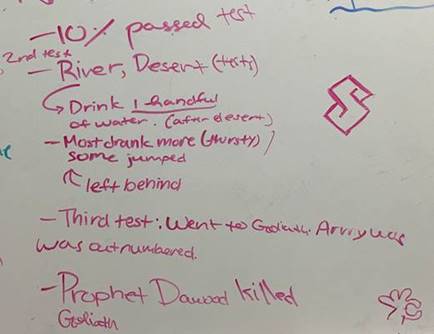
Lesson [31]: Modern Challenges – Speech to the Muslim Youth by Dr. Yasir Qadhi.
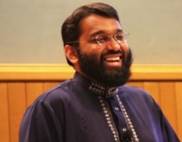
Dr. Qadhi

Homework:
Listen to the lecturer by Sheikh Dr. Yasir
Qadhi, and then answer the questions below from the lecture. Be thorough.
No short answers are accepted.
1. What are the differences
between the generation of Muslim youth born and raised in America and their
parents who immigrated?
2. Why some young Muslims make
fun of their immigrant parents? How do you reply to these reasons?
3. Describe the some of the
challenges that the early Muslim immigrants in the sixties and seventies had to
go through.
4. Why do we have to stand
up in support of other victims of injustice by the American government and/or
society?
5. What is the meaning of
speak truth to power? Do the Muslim youth need to do that? Why?
6. Who is the single
greatest American Muslim? What was his position regarding Vietnam war? Why did
he take this position?
7. What are our
responsibilities as American Muslims?
8. What is the true
patriotism? Is it to support America regardless if it is right or wrong?
Explain.
9. What do you think about
the speech? Provide your own thoughts.
Lesson [32]: 7
Wisdoms of pain and suffering – Shaikh Dr. Yasir Qadhi

Homework:
Listen to the lecturer by Sheikh Dr. Yasir
Qadhi, and then answer the following question from the lecture. Be thorough.
No short answers are accepted. You can add your own thoughts at the end.
1. What
are the seven wisdoms of pain and suffering?
2. What do you think about
the speech? Provide your own thoughts.
Lesson [33]: – The Day of Judgment [1] (Lecture No. 1). By Shaikh Dr. Yasir Qadhi
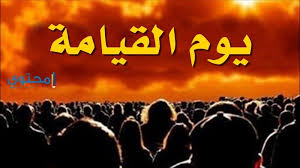
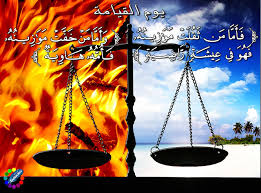
Listen to the lecturer by Sheikh Dr. Yasir
Qadhi and then answer the following question from the lecture. You can add
your own thoughts at the end. Be thorough. No short answers are accepted.
1. This
religion is based on three fundamental pillars. What are they?
2. All
religions of the world can be divided into two kinds. What are they? Name the
religions in each kind.
3. Almost
all religions believe in either the Day of Judgment, Karma or reincarnation.
Which kind believe in Karma and which religion believe in the Day of Judgement?
4. How
is Karma or reincarnation related to the concept of the Day of Judgement?
5. Did
the classical early Judaism believe in the Day of Judgment? How about the main
stream modern Jews today, what do they believe in?
6. What
are the seven techniques (or genres) mentioned in the lecture that Allah used
to prove the Day of Judgment? Give examples of each techniques. Make sure your
answer is thorough.
7. What
are the eight benefits mentioned in the lecture of believing in the Day of
Judgement? Make sure your answer is thorough.
8. After
listening to the lecturer, what are your thoughts about the subject and the
contents?
Lesson [34]: – The Day of Judgment [2] (Lecture No. 5). The Plains of Judgment Day. By Shaikh Dr. Yasir Qadhi


Listen to the lecturer by Sheikh Dr. Yasir
Qadhi and then answer the following question from the lecture. You can add
your own thoughts at the end. Be thorough. No short answers are accepted.
1. The
punishment is similar kind to the sin, i.e. same genres. Give five examples of
the condition of the bodies at resurrection of the following:
a. The
one who constantly asks people and he has no need.
b. Martyrs.
c. The
one who was giving Athan.
d. The
one who has been drinking alcohol.
2. Regarding
cloths at the time of resurrection, people are going to be naked and
uncircumcised. Who was the one resurrected first and who is the first one to be
clothed?
3. Animals
are going to be resurrected. Mention the evidences from the Quran that proves
the answer. Why animals are resurrected and what is going to happen to them at
the end?
4. Who
would wish to be ended like the animals? Why are they making this wish?
5. Who
is the one who is resurrected blind? What was his sin and how is it from the
same genres as the sin?
6. How
long the Day of Judgment? Does everybody have the same perception of how long
it is? Explain how?
7. Where
is the Hashir (tight gathering) take place, also called Mawqif (موقف)? Which land? Is it in the same earth we have now? Are the
skies going to be the same skies we have now?
8. Describe
the land of gathering in details, such as color, terrain, size, …etc?
9. How
do we find each other in the Day of Judgment?
10. Describe
the default condition of the people in the land of gathering in terms of their
heads, eyes and hearts/
11. How
high the sun above the heads? There are two interpretations, mention both.
12. Due
to the closeness of the sum, people will sink in sweat. How high is the sweat
and on what basis the height would be decided?
13. Add
your own thoughts about the lecture.





